#other than that the commentary for them is not very interesting at all. but its okay lol
Text
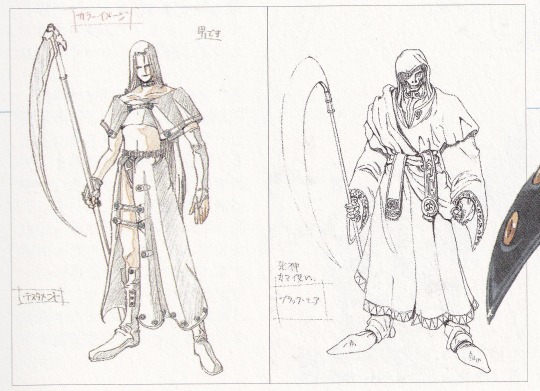
Lets all look at Cock Out and The Skeleton beta testament okay
#scanned gg character designer magazine pages. smile. waiting for them to upload to gdrive. smile#the skeleton is not new that was in the 10th anniversary book. but this is a better image#left 1 is new but only a little different from their final design. but well the difference is um interesting. smile#also? ive said that skeleton testament looks like an elder scrolls character. and well this says their name was fucking Blackmore.#literally some elder scrolls shit.#other than that the commentary for them is not very interesting at all. but its okay lol#its the shortest text of all the characters and it says ‘shinigami’ 4 fucking times like Yeah i know i get it. i get it.#daisuke has said interesting things about their design outside of this its literally fine.#i can be autistic about them rocking an even sluttier skirt and originally being named Fucking Blackmore#the kat goes meow#gg#testament tag#missing link
34 notes
·
View notes
Text
Beating the Heat while Fat: A Summer Survival Guide
Summer is (almost) here and it’s going to be hotter than ever. If you’re fat (like me), you know how much hot weather sucks. Specifically, we get to deal with fun issues like underboob sweat, chub rub, skin fold sunburn, and more. And while I like to take a body neutral approach to everything, this can be hard in summer thanks to exclusion and neglect.
The thing is that not a lot of people really... talk about these things, though, because that would interfere with our image of summer. Not a lot of companies are marketing their stuff as a solution to fat people’s problems, because that would be acknowledging that fat people might actually want to go outside during summer.
Having been fat for many a summer now, I want to share some of my resources for enjoying summer! These are all based on personal recommendations and things I have directly experienced. Please feel free to reblog and add on with your experiences and recommendations!
However, if your commentary is even remotely fatphobic, you will be blocked and your comments will be deleted. This post is not for you, and nobody is actually interested in what you have to say!
Back and Underboob Sweat
Two words: Gold Bond. Gold Bond fixes this. It comes in powder, stick, and spray form. I’ve used the powder in shoes, but not on my body. They’ve recently released an invisible form of the spray, which I’m very excited about.
Spray this under your breast tissue or other skin folds, or on flat areas of skin like your lower back that tend to sweat. Some of their powders have aloe in them, which is delightfully soothing for the skin.
Make sure that if you’re sensitive to scent, you buy one of the unscented versions. The “fresh” scent is nice, but it is a scent!
When you’re using this type of spray, do it clean but dry. Don’t do it right after a shower- give your skin a chance to dry off. Lift your breast or skin fold, spray underneath, and then hold it for a couple of seconds to let the spray dry down.
You can also use other types of powder, like body powder or baby powder. There’s mixed evidence about talc-containing powder and its link to cancer, but some people do find talcum powder more irritating than talc-free powder, so whether or not you use this is up to you.
Do keep in mind that this is NOT sunscreen! Apply your sunscreen first for areas of exposed skin.
Chub Rub
Dealing with the tops of your thighs rubbing together is extremely unfun. There are a couple of ways I like to deal with this!
Slip Shorts
I actually reviewed a bunch of these a few years ago. Slip shorts or bike shorts are perfect for wearing under dresses or loose-fitting rompers as a way to stop your thighs from rubbing. As a bonus, if you’re using bike shorts, sometimes they come with extra pockets to stash stuff in.
Friction Sticks
If you’re wearing a swimsuit and don’t want to wear shorts, or just don’t want to wear shorts, period, then a friction stick is another good way to avoid chub rub! I have a couple, Bodyglide and Gold Bond.
If you’re buying Bodyglide, they have one that’s just as good, Bodyglide Outdoor, that is sometimes cheaper. There’s a Bodyglide “For Her” which I’ve never tried, but that’s usually more expensive and let’s be real, do you really need to moisturize your inner thighs? I think not!
There’s also creams you can use but I find those messy and less effective than the sticks. You might like them, though! Experiment with products to find the one(s) that work for you.
Friction sticks can also stop foot blisters. Rub a little on your heel, toe, or wherever you get hot spots.
Dealing With Sweat
I sweat, you sweat, we all sweat. Humans were meant to sweat. Sweating’s a good thing. But that doesn’t mean it’s fun, and frankly I hate being sweaty. Typically, fat people sweat more than thin people, for several reasons related to the way we thermoregulate.
Fortunately, there are lots of ways to make summer sweating less annoying. I’ve written about this before, so you can check out that post for some of my favorite tips for dealing with sweat. Here’s some of the highlights.
Evaporative Cooling
A bandanna or other wrap filled with water crystals can do AMAZING things. You can make this yourself really easily- if you can’t find water crystals, you can just use Orbeez. They sell little 99 cent packs of those in the checkout lines at some stores and at the dollar store, and you can make several cooling wraps with one packet.
You can also get evaporative cooling towels, like Frogg Toggs. I don’t like those as much because they tend to start smelling a little funny, but they’re great for larger area coverage.
Using these will help cool you down and will do the same thing that sweat does– without being sticky.
Hair
If you have long hair, get it off the back of your neck. I used to put it up in a bun with a bun former, but now I just use claw clips. They’re cuter and easier! Seriously, this will help you so much. Get the hair up and away from your skin, you’ll feel so much better.
Hand Fans
I always have a hand fan with me, but not one of the little battery operated ones. I’ve tried a lot of those! I even took one up a mountain once, and it was the only reason I survived. But they never provide the same level of breeze that my folding fan does.
I use this one because it’s cute, and you can get cute ones for a couple bucks on Amazon. I do prefer fabric to the stiff paper ones, just because they’re a bit more durable- I’ve had mine for years now. It’s good.
I’m also not a huge fan of those fans that go around your neck, but I’ve seen many people enjoying them. If they work for you, great!
Hydration and Electrolytes
Carry water with you when you go places, and if you’re gonna be out for a while doing anything strenuous, take some electrolyte tablets with you. I like Nuun because I think they taste good, but there’s lots of brands out there.
There’s no one mineral called electrolyte, just so you know. Electrolytes are a group of minerals that includes sodium, potassium, and chloride as the primary (or significant) electrolytes.
Electrolytes are important because they have a natural positive or negative electrical charge when dissolved in water. This electricity is how your nerves transmit information and how your cells make your muscles contract, so low levels of electrolytes can cause some serious issues.
Different electrolyte imbalances have different symptoms, but common symptoms include nausea, fatigue, confusion, tremors, muscle spasms (cramps), and dizziness.
If you’re feeling those as you’re moving around outside, get somewhere cool, drink some water, and either eat some food or add electrolyte tablets to your water. This will help stabilize you quickly!
Skin Fold Sunburn Prevention
Everybody should wear sunscreen, period. End of story.
But if you’re applying sunscreen by yourself and you have skin folds, it can be a pain to reach them! This is especially true for any folds that form on your upper back or around your upper arm.
These areas can burn and be very painful, especially if you’re in swimwear or a sleeveless top. It’s also VERY easy to forget that these areas need sunscreen!
If you don’t want or don’t have someone to help you apply those areas you can’t reach, spray sunscreen can be a way to get those areas. If you don’t like the spray or want heavier coverage with a cream, then use a lotion applicator!
If the stick style doesn’t work for you (like if you have shoulder mobility issues), the strap style asks for a different range of motion. If you can’t find one that works for you at a big box store, look at a pharmacy. These are often sold as disability aids or for elderly people with a reduced range of motion.
But honestly, one of the most important things about this is just knowing your body. Know where your skin folds are and think about how they move as you’re applying sunscreen. Get underneath them- as you move, those areas can be exposed to the sun, too.
So yeah, that’s my best advice for beating the heat while fat. If you’ve got other tips, feel free to share them!
#summer#body neutrality#i do not know how to tag this#also please don't complain about the length of the post#it's a reference guide a tldr would be meaningless
8K notes
·
View notes
Text
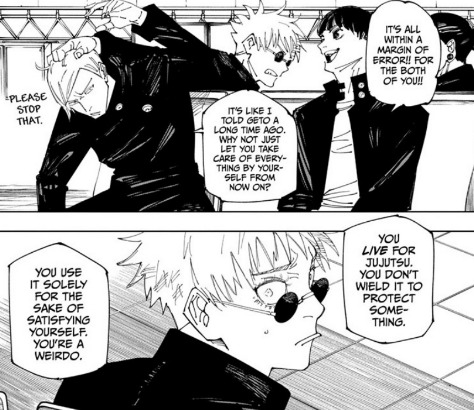
GREAT TEACHER, GOJO
For my final commentary on chapter 236, I thought I'd talk about this panel the starter of a million flame wars on twitter dot com. The big controversy is Nanami stating that Gojo fought only for himself without mentioning his students which a lot of people thought was a last minute reversal on Gojo's character, or character regression.
I'm not going to call anyone stupid, or say if you have good teacher Gojo headcanons you're wrong. However, I'd like to point out that Gojo's always been more complicated than most shonen mentors. He's not Kakashi, and he's not Aizawa, and I'd argue the fact that he's not the standard "I'd die to protect my students" mentor we see in shonen manga is what makes him interesting.
The Springtime of Youth
Jujutsu Kaisen is a shonen jump manga that is very aware of the other manga that are running in the same magazine and uses that awareness to play with audience expectations.
To put it simply if you don't want to use words like Deconstruction - if you're reading Jujutsu Kaisen then things are probably not going to go the way you expect them. It's not Naruto, it's not My Hero Academia, it's a little bit like Bleach except characters actually die.
If you expect things to go one way in Jujutsu Kaisen, then you're going to be thrown a curveball. To name some examples briefly before diving into Gojo.
Yuji Itadori is a normal boy protagonist suddenly dragged into the world of the supernatural.
However, everything goes wrong from there. Jujutsu Sorcerers are not heroes. Yuji is told that much from the beginning by Megumi within the first thirteen chapters. The world of Jujutsu Sorcery is not a good place to be, Yuji is initially excited to be a sorcerer and to be a part of this world and then learns that lesson fast. I mean, imagine if Deku was accepted to UA, and then he immediately learned that students at the school die on the regular and all the adults are either terrible selfish people, or if they're not they die too like Nanami because being selfless means sticking your neck out for someone else.
Yuji's not really special in the narrative. He's just a kid who swallowed a finger. He doesn't have a secret technique. We're hundreds of chapters in and he's still just punching people. If he's cornered in a fight he doesn't unlock a secret technique either, he just loses.
Yuji has a superpowered evil side, like the nine tailed fox, or Hollow Ichigo except it's not really his super powered evil side. It's an evil parasite attached to his soul with a will of its ownt hat will manipualte him. Hollow Ichigo and the Kyuubi can escape temporarily and there's usually no consequence. Sukuna escapes twice, the first time he nearly kills Megumi, the second time he kills thousands.
Yuji is kind of like a main character who is not a main character.
If you still believe he's the main character, then you can agree he's punished for thinking he's the main character and therefore things are going to be easy, because nothing is ever easy in Jujutsu Kaisen.
Megumi is a riff on the chosen one. He's supposed to be the Gojo Satoru of his generation, born with the strongest technique that ca even surpass the limitless and he's nowhere near the level he's supposed to be. This is because Megumi has been continually failed by every adult figure all his life, starting with his father who sold him, then Gojo the man who SAVED* him techically but with a big asterisk that he needed to become his student and do jobs for Jujutsu High School otherwise Gojo would just let the Zen'in take him or let them starve I guess. Megumi has no adult figures to rely on, and has been given very little freedom about who or what he wants to be in his life, and therefore he's a very passive, repressed individual who's riddled with insecurities. Megumi doesn't want to be the strongest like Gojo, or like many hero / rival characters in shonen manga. Megumi doesn't even know what he wants to be, because he's never been given any choice in life.
If you don't think Megumi's a deconstruction of any sort of character type, look at those posts on twitter that are like "Look at the black haired depressed shonen boys" and then look at Megumi, he's never actually like any of these boys because he's much deeper and probably closer to being the main character than Yuji is.
Then we get to Gojo who is very unlike all the other mentors in shonen manga.
If Yuji and Megumi are both riffs on a main character, a hero in a world so cynical he's not allowed to play hero and actively punished for it, and a chosen one who doesn't want to be the chosen one then you have Gojo as the mentor who's nothing like the classic mentor.
The problem with mentor characters in fiction is that number one they die a lot (spoiler warning Obi Wan Kenobi dies in Star Wars just so you know) and number two they're not usually the most complex character in the cast.
What is the mentor there for?
To Mentor (duh.)
What this means is they are usually a fully formed adult who can teach a lesson to the main character, who in shonen manga is typically a teenager.
I say they're usually less interesting because stories are about characters changing, or characters learning lessons. A teacher presumably already has learned his lesson. They are usually at the end of their journey and not the beginning, that's why they can offer wisdom to the main characters. They're not usually their own separate characters because of this - a narrative doesn't have time to waste on a character that's not going to change.
Jung had a term for this character, it's called the Wise Old Man.
In Jungian analytical psychology, senex is the specific term used in association with this archetype. Examples of the senex archetype in a positive form include the wise old man or wizard.
In the individuation process, the archetype of the Wise old man was late to emerge, and seen as an indication of the Self. 'If an individual has wrestled seriously enough and long enough with the anima (or animus) problem...the unconscious again changes its dominant character and appears in a new symbolic form...as a masculine initiator and guardian, a wise old man, a spirit of nature, and so forth'.
The role of the wise man archetype is to help other people along with their ego development, because usually they are already fully developed individuals.
Obi Wan is the most typical of typical mentors, and he dies in Star Wars because after he finishes teaching Luke he has nothing to do. This is Luke's Hero's Journey. Obi Wan's already happened offscreen, he's at the end of his journey there's no room for change or growth in him because his story purpose is to exist to advise Luke and to do that he needs to be a fully grown adult figure.
The subversion to this when the mentor has their own agenda (Gandalf), or the mentor is as flawed as the main characters themselves and so therefore he has something to learn.
Gojo is kind of a combination of both, like Gandalf he is the mysterious but seemingly all powerful wizard (er... or rather sorcerer) with his own agenda, and he's also practically the fourth member of the main cast who are otherwise all teenagers. In fact, Gojo spells out his agenda in the same panels that everyone uses to constantly assert that Gojo is a good teacher who only wants to protect his students.
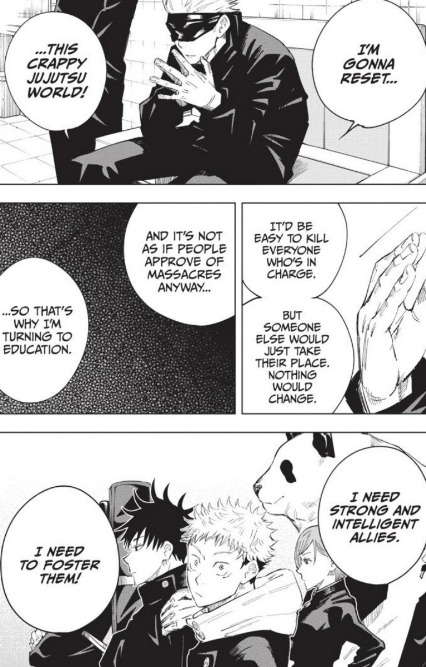
He wants to make the Jujutsu World a better place (good) which is why he is raising students so he can turn them into his political allies to make a regime change (hidden agenda).
It's a means justifies the end type scenario. In Gojo's mind the means (raising kids as tools in support of his political agenda) justifies the ends (a better jujutsu world for those children). His motivation is still the same. This is what I think people most often get confused about with Gojo's character. I think he is one hundred percent genuine about wanting a better world.

"I have a dream, I want to reset this crappy Jujutsu World" is his motivation, but not his means. He uses his students as a means to achieve that end. Even if it's purportedly for their sake, he's still using them. I don't even think this is subtext it's text, both Megumi and Yuji call themselves cogs.
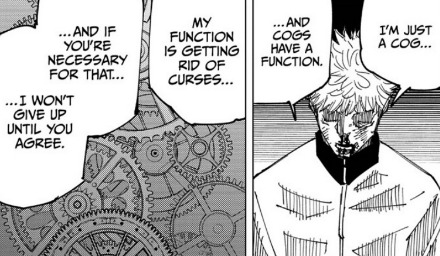
"But senpai, what's your function...?"
You could say in this case that the ends don't justify the means. Is Gojo really protecting these kid's youth, if Yuji and Megumi are going around calling themselves cog and acting like they don't matter in the grand scheme of things? In fact the narrative is inviting you to question if Gojo's ends justify his means.
Gojo's ideals can be one hundred percent real, but he can also pick faulty ways of choosing those ideals that fail to live up to them. In fact most people fall short of ideals, that's why they're called ideals. Gojo is taking these kids in because they have strong potential as sorcerers and he wants to recruit them, that's his hidden agenda. It's confirmed in databooks in Yuji and Yuta's case, and even if you don't trust databooks as canon then look at how he treats Megumi.
Megumi is explicitly Gojo's student, not his son. He only intervened in Megumi's situation on the caveat that Megumi work for him. Presumably, if Megumi didn't want to be a sorcerer and just wanted to be a normal kid, Gojo would have either let the Zen'in have him or do nothing. The option of just calling child services and getting someone to foster Megumi until he was older didn't even seem to cross Gojo's mind. There's the help he gives (Food money, rent, protection from the Zen'in) and then the hidden agenda (Don't work for the Zen'in who are my political rivals, you're my student now).
Yet at the same time Gojo is shown going to find Megumi after Geto's defection, probably because of the words he said to Yaga "You can only save those who want to be saved," when he realized it was too late for Geto. Was he intervening earlier for Megumi because he learned from being too late with Geto? Did he think Megumi needed guidance, or did he think Megumi needed protection in his youth so the Jujutsu World wouldn't corrupt him like it did Geto, or did he think he just needed to make it so Megumi was strong so he wouldn't fall behind him because Geto fell so far behind him once Gojo became the strongest. There's ambiguity there, because the hidden agenda is you know... Hidden. That's what I mean with Gojo though, you can look at him from multiple angles, he's not just (I love my students I'd die for them) because that character would only have one purpose in the narrative and that'd be being the perfect mentor who teaches them all the right lessons.
Gojo's not like other mentors, and in fact he's a commentary on the mentors that everyone is always comparing him to and expecting him to be like.
Literally everyone who reads Naruto has the exact same response, "I hate how the manga never talks about how it's a bad thing to send these child soldiers into war, and nobody breaks the cycle."
There are a lot of people unhappy about the same thing in My Hero Academia, "Why does nobody talk about how wrong it is that the adults make these high school students fight on the battlefield."
Well there you go. That's Gojo. His dream is to make it so Jujutsu Society is a place where teenagers can survive until adulthood. His method of doing so is to... raise those teenagers to be stronger than the previous generation, but you know still letting them be child soldiers on the battlefield just stronger ones. He does this because if he's working within the system the his two choices are raise a group of people who can age out and replace the old regime, or just kill everyone at the top.
Everyone complains about how no one talks about the child soldiers in Naruto or My Hero Academia, but here you go, we have a manga that is centered around how messed up it is to send high school students to continually fight these curses before they even turn eighteen. Gojo's sending these kids out there still even if he wants to change things, and it's supposed to be a little messed up and also a contradiction to what his ideals are supposed to be.
Because in My Hero Academia you have characters like Aizawa and Kakashi who are "I will die for my students" but then they just send those teens out to fight in a war, and seem totally fine with that. It's a hole in the writing, but this time it's done on purpose, to ask why these adults are always comfortable sending teenagers out to fight for them?
Jujutsu Kaisen provides two answers, number one the system is inherently corrupt and it sees the youth as cogs because the system is rooted in traditions that keep the elderly in power. Number two, in Gojo's case at least this is exactly what it was like for him growing up as a child. Gojo is just repeating with his students what was done to him, subconsciously.
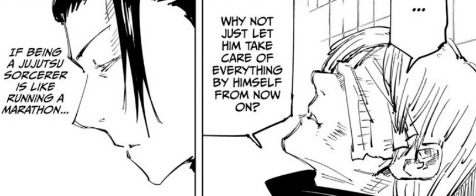
The reason Nanami said this, and then repeated it in this most recent chapter is Gojo was born to be a Jujutsu Sorcerer. Being a Jujutsu Sorcerer is a highly deadly occupation for everyone else, except for Gojo. Not only that but because he's so good at it, and he's so lauded for it he's built his entire identity around it. Nanami's not just saying that Gojo is selfish, he's also saying that Gojo thinks being a sorcerer is a good thing. It is the end all, be all of Gojo's existence.
He doesn't want to make it so sorcerers don't have to fight, or make it so all cursed energy is gone for the world like Yuki Tsukumo, his dream is actually kind of limited in scope he doesn't want the school days of his students to be destroyed by the outside world the way it was for him and Geto.
Gojo looks at the symptoms and not the cause. Geto defected, Haibara died, Yaga wasn't really able to do much for his students in both scenarios. Gojo deduced it was because the elders and regressive policies were holding people back in favor of keeping the regime in charge (correct) and that because of that the sorcerers in Gojo's high school years just weren't strong enough to keep up (this is just what Gojo thinks).
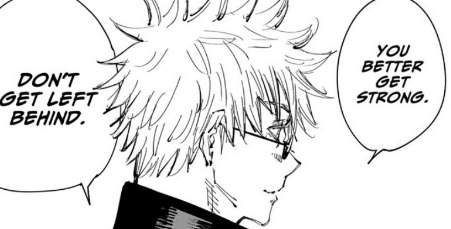
His words to Megumi are encouraging him to be strong so he won't get left behind, which as I speculated above might imply Gojo thinks that part of what went wrong with Geto was that he simply wasn't strong enough to keep up with Gojo or stay on his level. If not then he still encourages Megumi to get strong before everything else, he's not taking care of these kids emotional needs, he's pushing them to get stronger because in Gojo's mind that's the be all end all solution to every problem.
"Nanami's line was not saying that Gojo doesn't care about children, it's saying that "You live for Jujutsu." It is the lens through which Gojo sees everything, and so therefore he doesn't think of breaking kids out of the Jujutsu World, just making it a place that's slightly more safe for them. Gojo's ego is so strong that he only ever sees things from his point of view, being a sorcerer was fun for him, his high school days were the happiest time in his life before they got ruined by outside forces.
He's trying to protect those days for his children, but he's not arguing against the existence of an institution like Jujutsu High in the first place. He's not saying the teenagers should never be sent out on missions, he's saying we need to make the teens stronger. If they're stronger than they won't die (that's probably true but they'll be even safer if they don't have to go on missions in the first place).
Now we have a reason! Why do Aizawa and Kakashi send out child soldiers into the battlefield if their goal is to protect their students? Because it's a shonen manga and the main characters are all teenagers.
Why does Gojo send out teenagers to fight for him if he wants to protect them, well I just explained it.
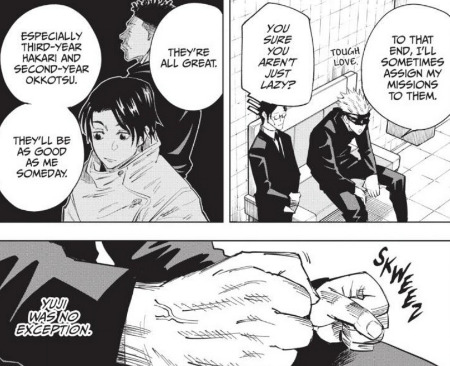
In fact, the entire purpose of Nanami in the story is to give us a character who explicitly treats children like they are children and not miniature adults. Who acknowledges that this is emotionally hard for children to deal with and they shouldn't have to do that.


Nanami's lines of "I'm an adult you're a child" and "Being a child is not a bad thing." would not have the weight they carry if they weren't so different from the way that every other adult in the story (including Gojo) treats children.
Nanami and Gojo have the same goal of making being a Jujutsu Sorcerer easier for children, but Nanami practices what he preaches. He tells Yuji to stand back and that he doesn't need to fight if he sees an enemy that's too strong, to let the adult on scene handle things first.
When he sees that Yuji is disturbed by the idea of killing former humans that Mahito had changed with his technique, he consoles him. He knows that Yuji is a sensitive kid and tries to spare him as much of that grief as possible. When he leaves Yuji behind he tells him explicitly that he's the adult in this situation, he shouldn't be forcing a child to help carry that burden if it's not necessary.
He also explicitly tells Yuji that being strong or jumping into life threatening situations =/= as growing up. Nanami is a character aware that the problem isn't that the children are not strong enough, but that too much responsibility is being thrown on these children. That there is a difference between what children and adults are emotionally capable of. Gojo doesn't see that difference because he reached enlightenment as seventeen. He even explicitly chose Nanami because Gojo knew he wasn't good at that stuff.
Nanami was not saying that Gojo doesn't care about children, Nanami was saying Gojo lives to be a sorcerer, Gojo who loves sorcery doesn't understand why being a sorcerer is too much of an emotional burden on a child. He just doesn't. He literally says his students are flowers.
Now, here's the kicker. Nanami dies.
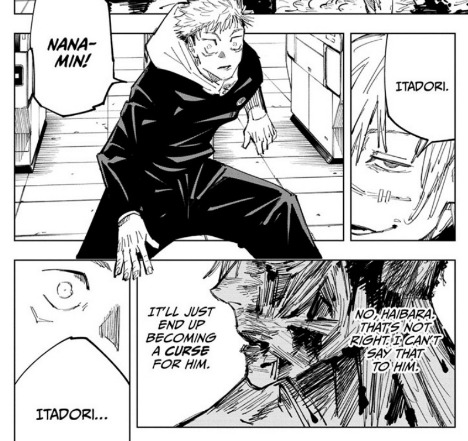

Nanami wanted Yuji to not take on too much responsibility, and he died leaving Yuji with more responsibility than he could ever carry. Nanami failed in his goal, despite the fact he is the most responsible and well-meaning adult in the story who treats children like they're children.
The reason he dies is because this is what happens to people like Nanami in Jujutsu Society. The whole of society is built to condition people into being cogs and Nanami who's just one person can't overcome it on his own. I can write a whole meta on how Nanami's way of dealing with children is way better than Gojo's and yet they do essentially the same thing, throw way too much responsibility onto Yuji even though he's just a kid. They're both too ingrained in the system to make any sweeping changes, and that's why the child soldiers keep on child soldiering.
Gojo as a Character
The second reason as eluded above that Gojo is not meant to be read as a perfect teacher, or even a good one really is because he's the fourth main character of the cast. If you are a main character, then you need a flaw, and an arc where you either improve upon that flaw or you succumb to it in tragic fashion.
Gojo's not the perfect adult mentor, because he's kind of in the same place as the kids themselves. I think there's a reason we never learn anything about Gojo's backstory, we know nothing about his parents, the Gojo clan, because those details aren't as relevant. The most important thing about Gojo is the three years he spent at high school, because that was the only time he felt like a person, and also because he is trapped there mentally.
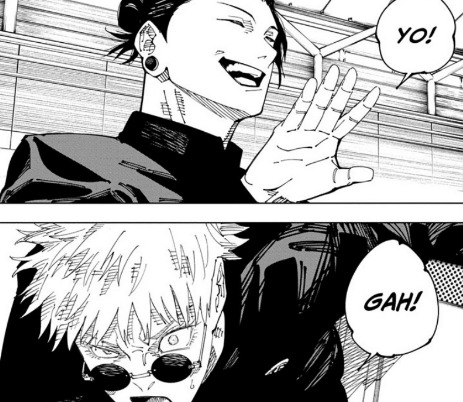
There's a reason that Gojo's dying dream is him imagining everyone reset to seventeen years old, because that was where the clock stopped for him in his youth, and that was where all of his regrets as an adult come from. His motivation to help teenagers today only comes from his own youth being ruined, and the adults in his life failing to protect him.
It's very likely that Gojo who lives for Jujutsu probably would never have realized the problems in his current society, if his youth wasn't ruined by those same adults he's now fighting against.
The reason most mentor figures in fiction are not main characters is because as adults they don't really need to grow up anymore. The obvious solution is that you just need your mentor character to just fail to be an adult in some glaring way.
To show how Gojo falls short as an adult, especially in regards to these children and how he treats them is to drag him down from all powerful, all knowing wizard, and make him struggle with the rest of the main cast. Gojo is not a positive adult figure in these kids lives despite having the best of intentions, because he's not really an adult.
I guess if you were already the best and strongest person in the world at seventeen, smarter and more capable than all the adults around you, you wouldn't really feel the need to grow up. Coupled with the fact that you are alienated from other people and do not relate to them on a personal level that's not going to help with your identity formation.
I mean I constantly compare Gojo to Superman, but to be fair to Gojo instead of bullying him like I usually do Clark Kent was raised by parents who raised a boy not a superman, and who constantly tell him that he's just a normal person, his powers don't make him great, it's his heart.
Nanami says that Gojo only fights for himself that ""You don't wield Jujutsu to protect something, you use it solely to for your own sake. What a weirdo" it's likely Gojo only fights for himself because he's never ben told that's he's more than just the six-eyes and more than just the limitless.
The best way to make a mentor a part of the cast, is to make them through some way or another have failed to grow up properly in their youth and therefore they need to do it while the story is taking place. We know how Gojo failed, his springtime of youth ended early, it ended the day he couldn't stop Geto from leaving, the day he can be the strongest sorcerer ever and still fail because sorcerer society is too corrupt for one person to handle alone. We also know he didn't really grow up past this point, because he still thinks the solution is to make people be stronger. Why does he not do anything about Geto for 11 years? In story terms he's basically suspended in time unable to grow past Geto. Kenjaku literally uses the trauma from his youth and the memories that seeing Geto alive would provoke in Gojo again, to trap him because he knew it would make him freeze up. Gojo is frozen in the past, he failed to grow up in story terms and must now grow up while the main story itself is taking place along with the children he's trying to raise.
This is how you make a mentor interesting. You have to make them flawed in some way that makes it worth having them onscreen, because a perfect mentor only serves one purpose to teach a main character and then he's gone.
Dazai Osamu from Bungo Stray Dogs is a character that's almost as massively popular as Gojo. Similiarly, he is a teenage genius who found trouble relating to other people who is now as an adult attempting to mentor two children.
However, Dazai's faults as a mentor are made much more explicit.
Dazai suddenly punched Akutagawa in the face, preventing him from finishing his sentence. Akutagawa flew back onto the ground, his head bouncing off the stone flooring with a thud.
"Perhaps I made it look like I wanted to hear excuses. Sorry for the misudnerstanding," Dazai said while rubbing his knuckles.
"Urg..."
Akutagawa moaned. He'd hit his head so hard that he couldn't even stagger to his feet.
"Give me your gun," Dazai ordered one of his men. The subordinate was hesitant but nonetheless handed over his weapon. Next, Dazai removed the magaine from the automatic pistol, took out all but three bullets, then put the magazine back in. He immediately pointed the gun at Akutagawa, who was still on the ground.
"I have this friend who's supporting several orphans all on his own, you see," he continued his weapon still drawn and aimed at the boy. "AKutagawa I'm sure Odasaku would've been patient enough to give you the guidance you needed had he been the one who'd found you on the brink of starvation right in the slums. That would have been the 'right' thing to do. But 'righteousness' doesn't take very kindly to me. And there's only one thing people like me do to useless subordinates."
Dazai mercilessly pulled the trigger the moment he finished his sentence.
(Don't worry, Akutagawa lived). Dazai is a character who had a troublesome youth he never grew up from. He was too smart for the world as a kid, and because of that joined up with the mafia because he wanted to feel like he was more connected to life and other people by getting closer to death (weird dazai logic I know) and was the best of the best at it, but it only drove him further away from people. He makes one friend, and loses that friend similiar to Gojo. Just like Gojo too, that friend is the one who gives him his purpose as an adult that drives him to mentor young people.
"Odasaku.. What should I do?"
"Be on the side that saves people," Odasaku replied, "If both sides are the same, then choose to become a good person. Save the weak, protect the orphaned. You might not see a great difference between right and wrong, but... saving others is something just a bit more wonderful."
Is this not what Nanami said just in different words. Odasaku tells Dazai point blank, I know you're selfish, I know that you don't really have any concept of good or evil but you can choose to save others anyway.
Isn't this what Gojo does?
He is selfish. He doesn't really consider the morality or his actions or get hung up on the idea of protecting the weak like Nanami or Geto do, but he still does go out of his way to live for the ideal of saving children.
Both Gojo and Dazai are characters who are struggling with this ideal of saving the children, because while their ideals are good they themselves as people are morally gray. Adding onto that, they're also children and a good deal of their backstory is devoted to showing why they never really grew out of the mindset that they held as children.
The story doesn't call them horrible monsters for it, it's just saying that they need to grow up or face the consequences of not growing up.
"I have one regret," I said. "I never got to say good-bye to my friend. He was always there for me as 'just a friend.' He was bored of this world and always waited for death to come for him."
"That man was in search of a place to die just like me?"
"No, not exactly," I answered. "I thought you were similiar to Dazai at first, rushing into battle and wishing for death without even considering the value of your own life. But he's different. He's sharp-witted with a mind like a steel trap. And he's just a child - a sobbing child abandoned in the darkness of a world far emptier of the world we're seeing."
He was too smart for his own good. THat was why he was always alone. The reason why ANgo and I were able to be by his side was that we understood the solitude that surrounded him, and we never stepped inside it no matter how close we stood. But in that moment, I kind of regretted not stepping in and invading a little.
Does that sound like the narrative is condemning Dazai for being who he is? No, it's Dazai's best friend offering empathy and understanding for how lonely it must be, and how if Dazai made real connections with people then he could have a chance of growing up like everyone else. That's what the narrative challenges Dazai to do while empathizing with why it's harder for him to and why he's still trapped in his youth, because to take care of children you need to be an adult yourself. Otherwise if you're a child, and I'm a child, then nobody's driving the plane.
Rupert Giles from Buffy the Vampire Slayer is another mentor who faces the same moral dilemna that Gojo does. In fact his entire character revolves around the fact he knows deep down he's sending a kid to her early grave.
Buffy is the Chosen One TM. One girl in all the world is chosen to fight the vampires. Much like sorcerer society, there is an entire bureaucracy dedicated to identifying the chosen slayer and then raising her up and guiding her as a weapon to be used against the threat of vampires and demons.
The watchers are all adults. The slayer is a teenage girl. The slayer slays. The watchers watch. Just like in Jujutsu Kaisen, there is a necessity for the Slayer to exist, because the alternative is just letting vampires eat people. Yet even if the slayer needs to exist, at the end of the day a bunch of adult men are sending a teenage girl to fight for them.
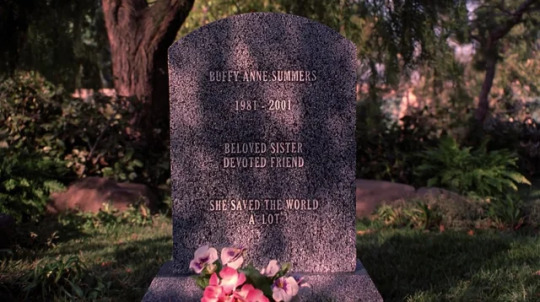
All Slayers die young. All of them without an exception. No matter how good of a mentor is, no matter how much he cares about her, Buffy is going to die one day, and Giles is going to watch. Because that's what the watcher does, they watch. Sending her on missions means Buffy's in danger, not sending her means innocent people are in danger.
It's a scenario that's pretty much like Gojo's, and the narrative of Buffy makes it explicit that Giles really can't be a father figure to bufy in this scenario. A father would have to choose to put their child above the world and keep them safe, not send them out straight into danger.
It is a choice that Giles makes over and over again. He is always her watcher and never her father. There's a season 3 episode where Giles literally drugs Buffy as a part of a test to prove she is "worthy" of being a slayer. A test that deliberately puts her in harms way that he complies with - because the system told him to. A choice to be her watcher and act according to what the council of watchers wanted and not what Buffy wanted. A choice that shatters the illusion that Buffy had of him, showing her that Giles is only there to teach her to be a Slayer, not to take her to the iceapades or buy ice cream with her.
In this scenario Gojo is very much like Giles as no matter how much he may personally like these kids, he is not their father, and there is only so much he can do for them when he's still feeding them into the same system. Giles loves Buffy, Giles wants to protect Buffy, Giles is a part of the system that exploits Buffy. Giles is an adult asking Buffy to risk her life to save the world.
Gojo goes out of his way to recruit Megumi, Yuji, and Yuta among others. Gojo still doesn't let them be anything other than sorcerers, and as sorcerers they're still guaranteed to one day die and probably die young. Gojo wants to revolutionize the system he is, but he still sends out his students to do missions as part of that system. He's not letting them escape it, he's just making them be stronger sorcerers.
Not only is Gojo not a father figure to Megumi, he is exploiting him more or less. The option of Megumi not being a sorcerer isn't on the table. No matter how well-intentioned he may be, or how good his ideals are he's still an adult telling a child to make a sacrifice for the world.
So, there are two character conflicts with two different mentors that both reflect Gojo. Gojo cannot grow up because he's still trapped in the tragedy of his youth. He himself is not an adult, for various reasons (lack of connection to other people, trauma in his youth) he's egocentric like a child but there are children in his life who need him to be.
Gojo also cannot be a proper adult, because he is part of a system that exploits children. We see what the system does to proper adults like Nanami, he shows us just how much well-intentioned adults struggle to help kids under sorcerer society so how about Gojo who thinks being a sorcerer is really fun. A proper adult would never send kids on those missions, they'd find some way to shield them but Gojo cannot do that. Because sorcerers are short staffed and innocent people will die if he doesn't. Because Gojo isn't the sorcer-king of Jujtusu Society and is working within it to affect change. There are reasons, but still Gojo is failing to live up to his desire to protect children because he's not doing what a responsible adult should do in this situation.
Gojo's failures are two-fold, and yet it's because of those failures that he was a main character who got as much special plot attention as he did. If Gojo was a perfect teacher he wouldn't be a character. After all, we relate to the struggles of other human beings we see onscreen in television and in movies so why would we care about a perfect character?
Gojo has a lot more to say about teachers in shonen manga, and also about childhood vs. adulthood as a bad teacher struggling to be a good one, then a teacher who's already perfect. Nanami said those lines because he wanted us to understand the audience that this is who Gojo is, he is a selfish and egotistical person who nonetheless was trying to do good things.
#jjk meta#gojo satoru#satoru gojo#nanami kento#kento nanami#jujutsu kaisen meta#jujtusu kaisen#jjk spoilers#jjk 236#jujutsu kaisen spoilers
685 notes
·
View notes
Text
Damn, the Ember Island Players were actually kind of radical, weren't they? The more I think about it, the more it feels like the only way it makes sense in-universe is if being Fire Nation propaganda wasn't the point of their play at all. Aside from a barely tacked on ending where Ozai kills Aang, the play is remarkably sympathetic to the Avatar and a bunch of enemies of the Fire Nation, even framing them as being heroes. Even at points in the story where theyre literally killing Fire Nation soldiers, the narrative still seems to be on their side; they're the underdogs, the relatable ones. Its true that the Fire Nation values strength, but still, you'd expect that in a propaganda play they would be portrayed as at least a little bit more sympathetic... And sure, to some extent the gaang's characters could be seen as defamatory caricutures (the slander on Iroh specifically was probably intentional), but that also might be due to the Players getting a lot of their information from the cabbage man, someone who actively hates the gaang and only ever really sees the worst of them. (And notably, that also means that the Players had worked with an Earth Kingdom merchant to produce the play.)
Mocking the gaang is also just clearly not the point of the play or what people are there for. Sokka's actor says that he's constantly being approached by fans; people genuinely love these characters. The gaang have built entire dedicated fanbases in the Fire Nation because of this play. Honestly, the fact that they're on a remote island is probably the only reason they're able to perform the play the way it is. I imagine it would get shut down pretty quickly on the mainland. Considering all the propaganda in the Fire Nation that we've seen so far, I wouldn't be surprised if the ending was only written that way because it's illegal to write a story where the Fire Lord doesnt win. The play reads less like propaganda and more like 'we're doing the bare minimum to get this story past the censors.'
I'm really curious about what it's like behind the scenes for the Ember Island Players. Are their shows just simple, shlocky entertainment, or could they also be deliberate political commentary? With no recording technology, a play is easier to slip under the radar than something like a book: it's impermanent, stays in one theatre, and performances can be easily tweaked if, say, Fire Nation royalty happens to come by. It's interesting to me that Ursa seemed to like them, while young Zuko had a disdain for them, saying they 'butchered' the story of Love Amongst the Dragons; in all likelihood the version of the story Zuko grew up with in the palace was heavily propaganda-filtered itself. Although, to be fair, they're arguably just not very good playwrights. When it comes to the characterization, I do think some of it only seems bad because we know what the actual characters are like, but a lot of it is just bad writing clearly meant for cheap entertainment. For example, they sexualize Katara quite a bit (and there's other, better analysis out there I've seen that examines how they fetishize her as a Water Tribe girl). And, of course, all of the characters are reduced to shallow and stereotypical comedy.
Still, I think they're worth commending for doing their research and telling a story about enemies of the state that's both sympathetic and surprisingly accurate to actual events, if not the characters' personalities, amidst the Fire Nation's rampant propaganda and misinformation. From the little amount of information about them we can extract from the show, they seem like honestly very interesting people. They're walking this tightrope line between being very close to the heart of the Fire Nation but also separate from it; between being cheap, inconsequential entertainment and being a source of actual news for Ember Island citizens; between telling the underdog story about a ragtag group of children and still trying to make it look like Fire Nation propaganda. I'm not trying to make any big argument on whether they were 'actually good people' or whatever, I just want to know more about them. I kind of wish we could see their production of Love Amongst the Dragons now...maybe I'll write something about them someday
#I wrote this in a haze after randomly catching the episode while my sister was watching it#I'm so fascinated by the inner lives of these people. What does it look like to write and produce these plays?#What does their day-to-day look like? How do the actors feel about their characters?#Actually if anyone has any fanfic recommendations in this vein please tell me#atla#avatar the last airbender#ember island players#the ember island players#atla analysis#zuko#uncle iroh#katara#ursa atla#cabbage man#cabbage merchant#fire nation
232 notes
·
View notes
Text
i've seen a lot of people saying that saltburn (2023) isn't a commentary on class, and genuinely, i have to disagree.
keep in mind, i watched this at 3am last night with my sibling, but i'm also a literature major with a focus in literary criticism of popular culture (including film), so i do know what i'm talking about!
spoilers below the break
first of all, framing saltburn as a conflict between the upper class and lower class is incorrect. in fact, that in itself is one of the major criticisms that comes up throughout it! oliver is quite literally not lower class, but uses the preconception that the cattons will view anyone in a lower social class than them as a tool to manipulate his way into their life. despite this, he is not lower class. and you are not meant to root for him, especially not towards the end.
the marxist theory of literary criticism surrounds the idea that in every story, one of the key concepts is a class struggle. this could be between any class, but the most common is the rich vs poor duality that shows up in most stories - ex. titanic, the fall of the house of usher. the thing is, in both of those examples, the sympathy lies with the victims - the lower class. in titanic, you are meant to feel guilty on behalf of the rich leaving the lower class to die. in usher, you are meant to feel anger towards the mistreatment of those who seek out the treatment the family offers. but while usher is a clear criticism of class, is that its main genre? is is purely a class struggle movie? no. it is a story inspired by edgar allan poe that surrounds horrors of family, trauma, and yes, class, but also morality. meanwhile titanic is supposedly a romance. though jack dawson is young and poor, he is not the only sympathetic character. what i'm saying here is that media is incredibly layered, and while on the surface level, something may not be entirely a class conflict story, those undertones exist throughout, no matter what. even take hit series percy jackson for example. there is still a class discussion to be had there, with percy and his mom struggling with finances, while annabeth and her father live comfortably.
but saltburn is interesting, because the antagonist throughout the entirety of it is, as far as the audience knows, lower class. you are introduced to him, not through judgement for his living condition, but through compassion and generosity. felix offers him a hand, even when he isn't in the same group as him. that in itself is a criticism of class dynamics.
listen. i hate rich people as much as the next gen-z college student. i personally have a hit list with many a billionaire's name right at the very top. but it's undeniable that, despite the class difference, the cattons - at least venitia and felix - are kind to oliver at first. obviously, he is a part of the other, but he is still a person. elspeth enjoys his presence. james treats him as a son. farleigh feels threatened by his presence, because he knows that, if they so choose, they could replace him with oliver.
i want to talk about farleigh for a second.
i literally have not seen anyone talk about farleigh, and i am upset about it. not only is he one of the most compelling characters - a supposed american slacker who lives with his extended family and blows their money on lavish means -, but he is important in the class discussion because it affects him directly. the cattons do not support his mother. she is in america, and although they have the ability to, they actively choose not to. the reason felix is bothered when farleigh implies that it is, in fact, a "race thing", is because it is. why is farleigh the one dependent on the cattons, and risking expulsion from the family? because he is the first other that they encounter.
and then pamela, who not only has sought help from the cattons, but disappears midway through with no explanation. she goes directly from rehab to them, and although she is trying to find a place to live on her own, the cattons offer her no assistance. they offer her nothing, and complain when she is in their space. they offer her NO help, when they so easily could set her up with a small flat and monthly allowance to help her find a job.
and not only is this a criticism of the upper class - the inactivity and extremely single-minded worldview that the cattons have, the amount that they are out of touch with not only the outside world and the lower class, but their own emotions -, it's also a criticism of the upper middle class.
as someone currently in college, whose parents are a college professor and a high school teacher, i am fairly middle class. however, there are so many people in my immediate vicinity - folks i know from high school, in my classes, extended family, etc., - who are Extremely upper middle class. however, they have the comfort of certain things that i, and my family, don't have. that's just part of life. however, in saltburn, oliver milks the "middle" in his "upper middle" class. he milks it, and he runs it absolutely dry.
someone truly in his alleged position would not be able to spend the summer lavishly and hedonistically gallivanting around the countryside of england, playing tennis and smoking cigarettes by the lake. hell, someone in my middle class position wouldn't be able to do that either, especially not while attending oxford fucking university. he would likely need to work, not just to support himself, but to support his mother, especially after - again, allegedly - his father died. and not only is this coming from a place of an oversight on his part, not realizing what his privilege truly is, but it also comes from a place of oversight on the part of the cattons.
do i think that saltburn is a movie about class? nope. at its core, it's a story about a desire for power and possession, ownership and obsession. there is this intense, almost vampiric lust throughout the entire thing, and that's in part what makes it the perfect setting for discussions of sexuality, of madness, and, honestly, class. wealth is power, and the cattons have a lot of it.
#saltburn#saltburn 2023#oliver quick#felix catton#barry keoghan#film#movies#saltburn movie#miles is dumb
246 notes
·
View notes
Text
Okay so I've spent a while thinking about how to word my actual problem with homestuck 2, and the works that make up post-canon homestuck more broadly. I think a lot of people resort to nitpicking bits of awkward writing or art in some attempt to pinpoint a source to an underlying sort of hollow uncanniness, which is funny because homestuck's supposed golden age of acts 1-5 are themselves FAR more of a tonally inconsistent mess of odd character beats, jokes that don't always land, and janky looking art.
Homestuck 2 has been written and drawn by very talented and passionate artists from the beginning, I think the actual issue comes down to a mix between the general pitfalls of hiring fans and the particulars of hussie's outsider background and unorthodox writing style.
First is the issue of hiring fans in general; while it can seem like an easy shortcut to finding talented writers already familiar with the voice and story of the original work, you have to be very aware of how fan culture operates. Beyond the obvious pitfalls that fans are unlikely to approach the story from a detached perspective, there is the larger issue that past a certain point fandom becomes essentially self sustaining. Once a fandom has existed for a long enough period, its most avid members have likely spent FAR more time engaging with other fan works than they have with the original art object. Fandom and the art it produces are, in this way, a sort of a folk tradition; artists are imitating and responding to other artists, characters become archetypes through which to explore certain ideas and dynamics, and the values and tastes of the most prolific and influential fan artists become as inseparable from a participants mental image of the character as the original work itself.
For an example, the affected theatrical mannerisms and cruelty Vriska adopts while in her Mindfang persona have become inseparable from the popular view of the character. Despite the fact that it's heavily signposted as a sort of role playing performance from the jump and she's more or less dropped it by the back half of the comic, it was nevertheless how she had acted in the bulk of her scenes around the time the ur-texts of homestuck fandom were being written, and as so an understandable misread of a character became inscribed into the fandom canon, and by extension her characterization in Homestuck 2.
All of this is extrapolated by the sort of unorthdox, building-the-plane-while-flying-it manner in which Hussie's writing style developed.
Based on his commentary, I get the sense that Andrew is an incredibly clever and thoughtful writer who lacks the theory and vocabulary to precisely describe his process. He tends to communicate in sort of abstract metaphors which aim to bridge the gap in explaining the actual conscious process he uses to plot his stories, but the way he talks about technical nuts and bolts writing craft stuff gives me the impression that his approach is largely intuitive, bordering on unconscious. He's a lot better at describing how he writes than what he writes or why.
You can of course piece a lot this together—his approach to art draws from the tradition of videogame spritework, where the visuals exist as a utilitarian vehicle for conveying information first and a work of illustration only inasmuch is needed to serve the greater story. His character writing draws more from a synthesis of literary fiction, sitcom writing, and "making up a guy" style posting humor, where characters are defined more by their life experiences and underlying psychology than by their goals and values, but also seem to have largely been constructed backwards from a starting point of a funny or interesting manner of speaking. Importantly though, I don't get the sense that these were conscious decisions, just that to Hussie they seemed like the logical way to approach these tasks, and I don't really think he could outline them in a way that would actually help a new team of creators grok how to draw and write in a way that feels like homestuck. I also don't think Hussie could actually explain the psychology that undergirds his character writing, I think he was mostly just drawing on his own life experience and imagining how this sort of character might logically speak and act.
As a novelist, and Hussie is one, both your thought processes and the sum total of your worldview and life experience are just as important to your work as the actual conscious decisions you're making, and I think that where there are gaps in understanding, the new writers are filling in the gaps with both a more conventional approach to the creative process and over a decade of accumulated fanon, and I think that's why homestuck 2 never really rises above feeling like a very well-made fanfic to me?
193 notes
·
View notes
Text
Now that the writers and actors strike is about to begin being felt (and as we wait for those greedy billion dollar companies who are refusing to negotiate fair pay and conditions to give up) here's 10 of my favorite (all around best) fully finished older series you should definitely check out if you haven't watched.
I mean it, these are the shows with continuously great writing and a satisfying endings that manage to actually deliver on their promises.
-----
1. Leverage - (containing 5 seasons, or 77 episodes) - trailer here.

Hitter, Hacker, Grifter, Thief and Mastermind. Heists and cons. Stealing from the rich and giving to their victims. They provide... leverage.
Meant for anyone who enjoys bad guys being the best good guys, who will burn down the lives of evil CEOs and then gloat in the background. Very satisfying.
Hands down the best example of a found family trope I've ever seen on screen. Barring none.
2. Killjoys - (containing 5 seasons, or 50 episodes) - trailer here.
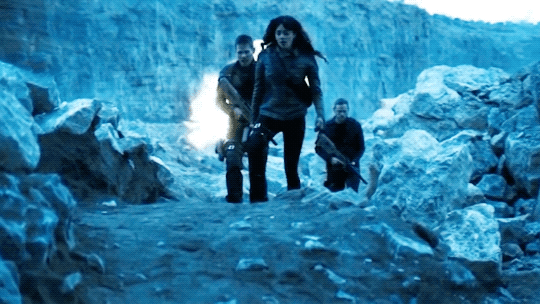
Space Bounty Hunters. Another case of found family trope. Bisexual space princess assassin. Quippy sentient ship. Green alien goo. Evil lesbians (but like... in a good way). The warrant is all.
More seriously though, it's a story about three killjoys and the bounties they go after. Initially. And then they have to save the entire Quad from some very terrifying... stuff.
Contains one of the best friendships I've ever seen on television.
3. Orphan Black - (containing 5 seasons, or 50 episodes) - trailer here.

Found family trope but with clones.
Low level grifter sees a woman who looks exactly like her kill herself and plans to take over her identity long enough to cash out. Except then there's two other women who also look exactly like her. And apparently they're all clones and someone's killing them.
Enter a global conspiracy. Human experimentation. Lots of clone shenanigans. Some serial killings. And a few murders 💖.
4. Person of Interest - (containing 5 seasons, or 103 episodes) - trailer here.

Okay I'm beginning to see how I might have a found family trope issue.
Former CIA agent gets recruited by a reclusive billionaire computer programmer who developed a... machine that can predict acts of terror before they happen. But it also predicts 'irrelevant' acts of violence that will result in someone's death.
Unless someone interferes.
I'd really like to spoil some stuff to get you all to watch this one. But I'm going to maintain self control and just mention that early on they get a dog named Bear. Bear is a very good boy. Watch it for Bear.
Also for excellent commentary on rights of privacy, government surveillance and what does 'greater good' even mean? But mostly Bear.
5. 12 Monkeys - (containing 4 seasons, or 47 episodes) - trailer here.

The very best time travel show out there. What starts out as a confusing mess of causality basically exploding, by the end of the series all makes complete and total sense.
(when that final timey-whimey loop slid into place and revealed the entire pattern it was like a choir of angels started singing in the back of my head. It was freaking glorious).
Anyway, a man from a post apocalyptic future travels into the past to stop a plague from decimating nearly the entire world population.
He has the name of the man who released the virus and it's supposed to be a single trip. One trip. One bullet. Simple. Done.
Except then things keep escalating, and escalating until time begins eating its own tail and it might start looking like the end of the world might be a better ending than erasing all of time and space from reality.
Because when our guys screw it up, they screw it up GOOD.
And oh yeah... found family.
6. The Good Place - (containing 4 seasons, or 53 episodes) - trailer here.
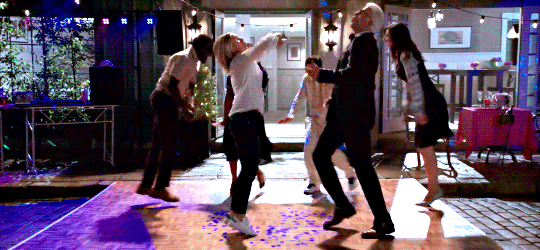
A self-proclaimed Arizona dirtbag opens her eyes and finds out that she's dead and got accepted in the Good Place. Except that as soon as she arrives the Good Place starts glitching, and she really, REALLY needs to become a better person before she can be found out and kicked out to the Bad Place.
Luckily her assigned soulmate was a professor of ethics and moral philosophy.
One of the funniest, most thoughtful and clever comedies I've ever watched. Ever. The characters are delightful and by the time the final minute rolled around I had sobbed my heart out multiple times (which, as we all know, is a sign of the very best comedies out there).
As for the question of whether or not this too contains Found Fami- Yes! Obviously, yes.
7. Avatar: the Last Airbender - (containing 3 seasons, or 61 episodes) - intro here (couldn't locate the trailer but it's basically the same thing in this case).
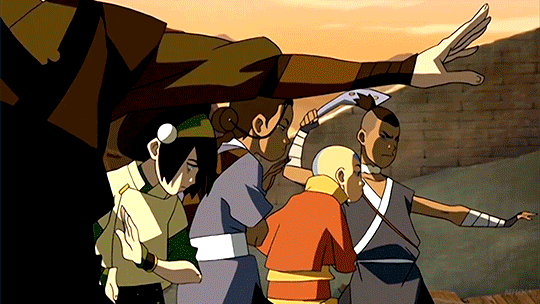
The four nations lived in harmony. Until the Fire Nation attacked.
It's been a hundred years since the beginning of the war when two kids from the Southern Water Tribe find a boy frozen in ice and wake him up. A boy who's able to bend all four elements... though not very well.
Enter multi-nation flying road trip (thank you Appa, we love you most of all) as they try to find teachers for the Avatar and save the world.
Includes found family (shut up), amazing fight scenes, the most heartfelt and vivid characters ever, and the best example of a redemption arc actually done well.
8. Love Between Fairy and Devil - (containing 1 season, or 36 episodes) - trailer here.
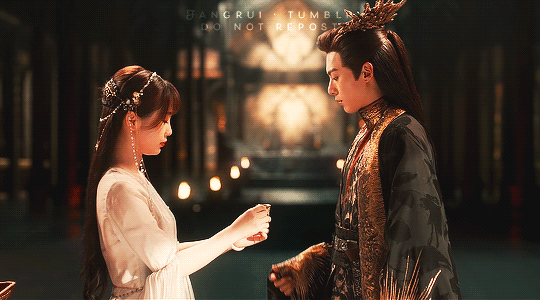
This one gutted me. I'm saying this as a compliment. But it had to be said. Completely destroyed me. I just haven't been the same.
A love story between an Orchid Fairy and the leader of the Moon Tribe that starts out with her accidentally releasing him from millennia long imprisonment and then takes you through the caleidoscope of all possible human emotions (it's a body-swap comedy through the first part, then a romcom, then a dramatic romantic tale, and finally a tragic love story).
But it's such a satisfying slow burn.
And it carries this... humanity through the whole thing that makes it so visceral.
If you're a romantic who's very tired of instalove and characters dropping all their morals because 'ooh, attractive person' then you've got to watch this. Because this story does NOT take the easy road there.
(my more extensive rec for this series can be found here)
9. Star Wars: The Clone Wars - (containing 7 seasons, or 133 episodes) - fanmade trailer here (it was better than any of the official ones).

This series did so much. Introduced Ahsoka Tano, and made us love her. Gave names and faces and souls to the Clone Troopers (okay, it's the same face but you know what I mean), to a point where their endings during Order 66 destroyed me just as much as the ending of the Jedi Order. And somehow made me both love Anakin AND be a million times more angry with him.
There are some arcs in this series that might be a bit weaker. But there were some... god, there's a reason I love Clone Wars more than any other series or trilogy in this universe. And I'm not even a little ashamed to say it.
Must watch for Disaster Lineage shenanigans; for the vod'e; AND for the Jedi (who did their best okay? They always did their best 😭💔).
(and on the subject of found family... do I even need to comment)
10. Nikita - (containing 4 seasons, or 73 episodes) - trailer here.
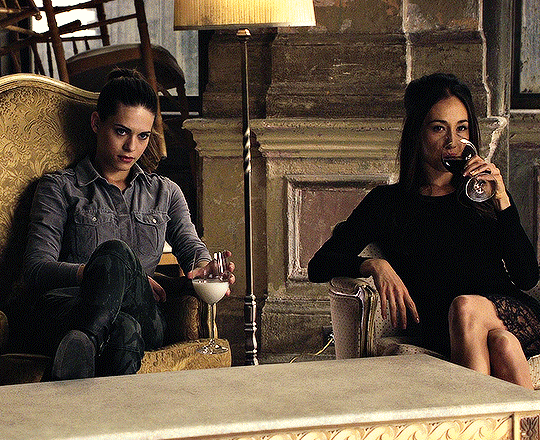
A rogue assassin that escaped Division - covert government agency that takes recruits out of prison, fakes their deaths and then forces them to become spies and assassins - has come back to take it down. Brick by brick if she has to. With guns and explosives too when that works better.
Contains soooo many cool fight scenes. Is full of incredible characters you'll fall in love with (and hate with) very quickly. And most of all has an incredibly complex relationship of mentorship and friendship between two women that holds both great admiration and betrayal, real care and love as well as rage and hatred, forgiveness, mutual respect and an unbreakable kind of bond that so very rarely involves even one female character on TV, let alone two.
(as usual, found family tropes up the wazzoo).
-----
In conclusion. We all know there's going to be a large space between seasons of our favorite shows now (and some shows that aren't going to survive it). Let's fill that space with some excellent TV we haven't had a chance to see yet.
And direct the blame for the wait towards the right place (i.e. the studios).
#leverage#killjoys#orphan black#person of interest#12 monkeys#the good place#avatar the last airbender#love between fairy and devil#the clone wars#star wars#clone wars#lbfad#atla#nikita#terapsina rambles#terapsina's tv rambles#tv recommendations#tv recs#tv rec#long post#sag aftra#it's possible i wrote out this whole thing just to talk myself into doing some rewatches#it seems to be working if yes#terapsina's leverage rambles#terapsina's killjoys rambles#terapsina's poi rambles#terapsina's the good place rambles#terapsina's atla rambles#terapsina's lbfad rambles
358 notes
·
View notes
Text
💿⚛️ davejade headcanons
sorry for leaving you guys waiting on this for like a week lol i kept being like “tomorrow for sure” but falling asleep but anyway here it is. i might add more to this if i think if anything but reblogs might not reflect the up to date source version so you can always find it here
most of these are pointing out stuff thats basically canon anyway but whatever lol. basically canon headcanons
dave tries to impress jade to get her attention because he likes her
this ones for you *misses hoop by 5 feet*
he doesnt mind jade’s inane riddles honestly. he isn’t perturbed by how she just knows things like rose is, because he doesnt think into it too far. he trusts her
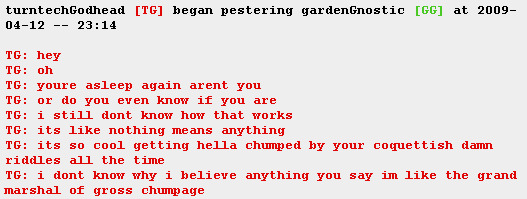
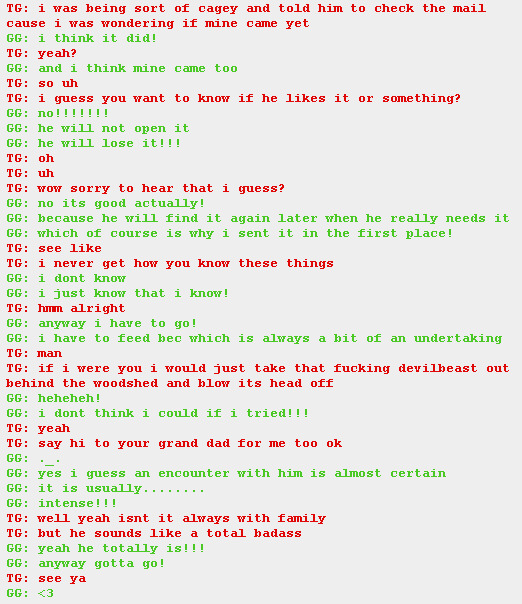

he spends a lot of time indulging in her interests and showers her in his music and poetry
they draw things for each other a lot <3 jade has the pictionary modus and seems pretty good at drawing and of course dave sent her sbahj as furries in the mail. sending jpegs over the internet is BABY NONSENSE. real boys send their childhood friend/crush pictures they drew for them through the INTERNATIONAL POSTAL SYSTEM to an unspecified island in the middle of nowhere, pacific ocean that gets packages dropped by plane so the recipient can tangibly hold it and hang it in their room
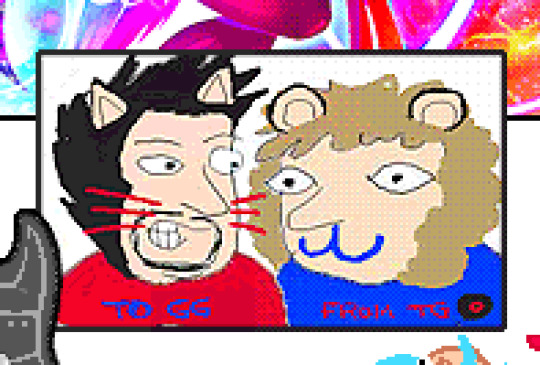
actually i was going through the commentary and hussie addresses it as such:
“Also notice her SBaHJ furry poster, which was clearly a very thoughtful gift from Dave”
aww
jade would give dave a "cool" plushie of a tiger or something nd he keeps it on his desk . froot’s beautiful idea
he loves her plushie sensibilities. so much less unnerving than his bro’s phallic puppets. they're still soft but no cognitive dissonance this time about the softness coming from foam puppet ass hoorayyy
theyre still reading homestuck on act 4 but they understood them instantly
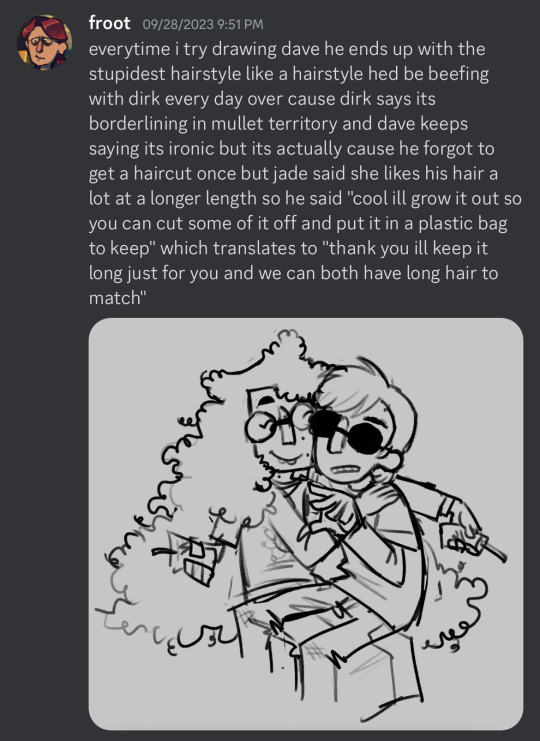
jade humors dave’s ironic cool facade because it makes dave feel more comfortable without feeling too exposed, but it’s because of this that he feels like he can open up to her because she isnt prying. (im still not over the smile here btw. only jade could make dave smile after a fucked evening where he spilled juice on his turntables and accidentally skewered an innocent crow with his sword and broke his window this mf is TYPING. also getting a bit of joy out of the fact that the only visible suit on his cards-themed bedcover in this panel is a heart)
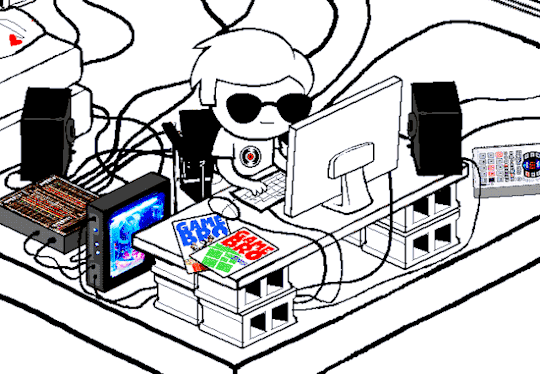
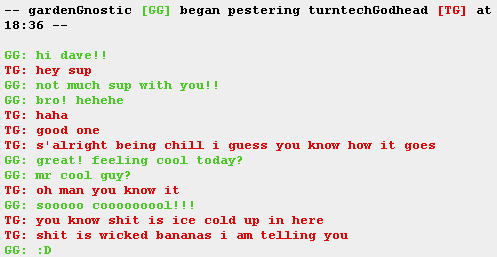
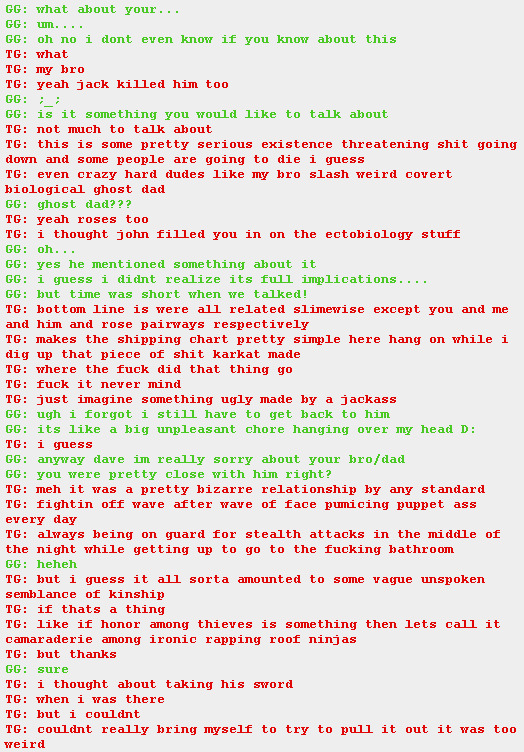
but he knows that jade is not unaware of what he's hiding. couldnt even refute her lol

from the knight’s perspective, it’s “i’m not as [blank] as i appear. i want you know that about me if i know you well and trust you, or i DON’T want you to know that about me if i DON’T know you well. the reason is that i want to know that i can trust you to avoid turning my insecurity into a Whole Thing”
basically she allows dave to take initiative when HE feels comfortable and confident in sharing the things he’s self-conscious about. this really helps him be comfortable and form a strong bond with her
dave would wrap his arms around her to “ironically” imitate a pair of tangle buddy squiddles (while actually concealing genuine affection basically unbeknownst to himself) but he winds up looking just a little too into it for just an “ironic” bit yall……
jade is slower to realize her deeper feelings since she shows love to everyone (so long as theyre deserving of it!!!) it just hits her one day that she actually Likes him in a special way, while for dave it is more dynamic and gradual but very on the downlow, expressed in creative acts and services
once dave actually recognizes he’s really caught feelings for her down the line, dave and jade happily do the tangle buddies hug all the time. its like their handshake. its their weird couple thing
these two when together as a unit they do not give a shit about what other people think of them
this shit lol:
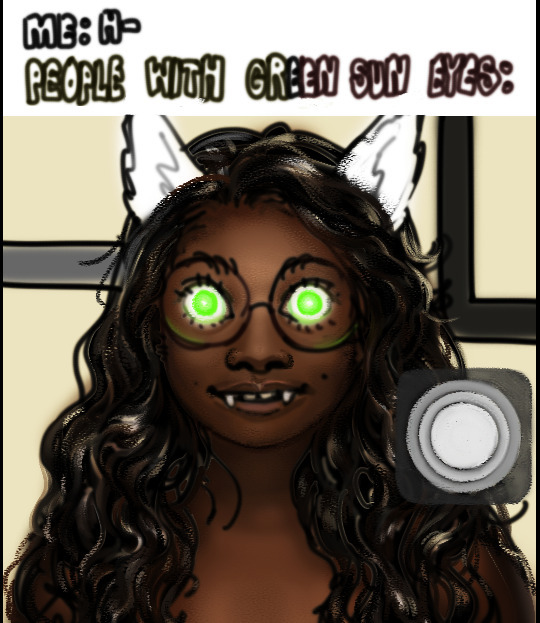
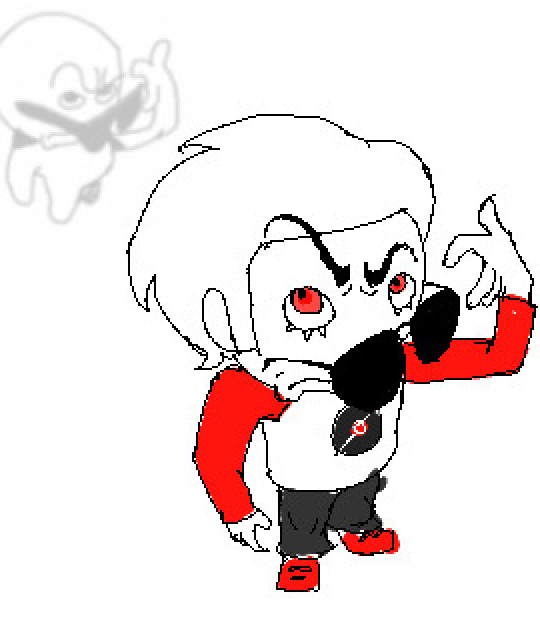
Creative Fucking Powerhouse the two of them
davejade ass song to me
jade is quite spacey and super appreciates dave’s level-headedness and steady pragmatism while at the same time not being a rigid stick in the mud about it. for example when they were acting as each others’ server players dave was advising her but it was appreciated by jade
sorry its just literally socionics duality LITERALLY THIS IS THEMMM (also i spent WAY too much time making these graphics and integrating texts from multiple sources please appreciate it)
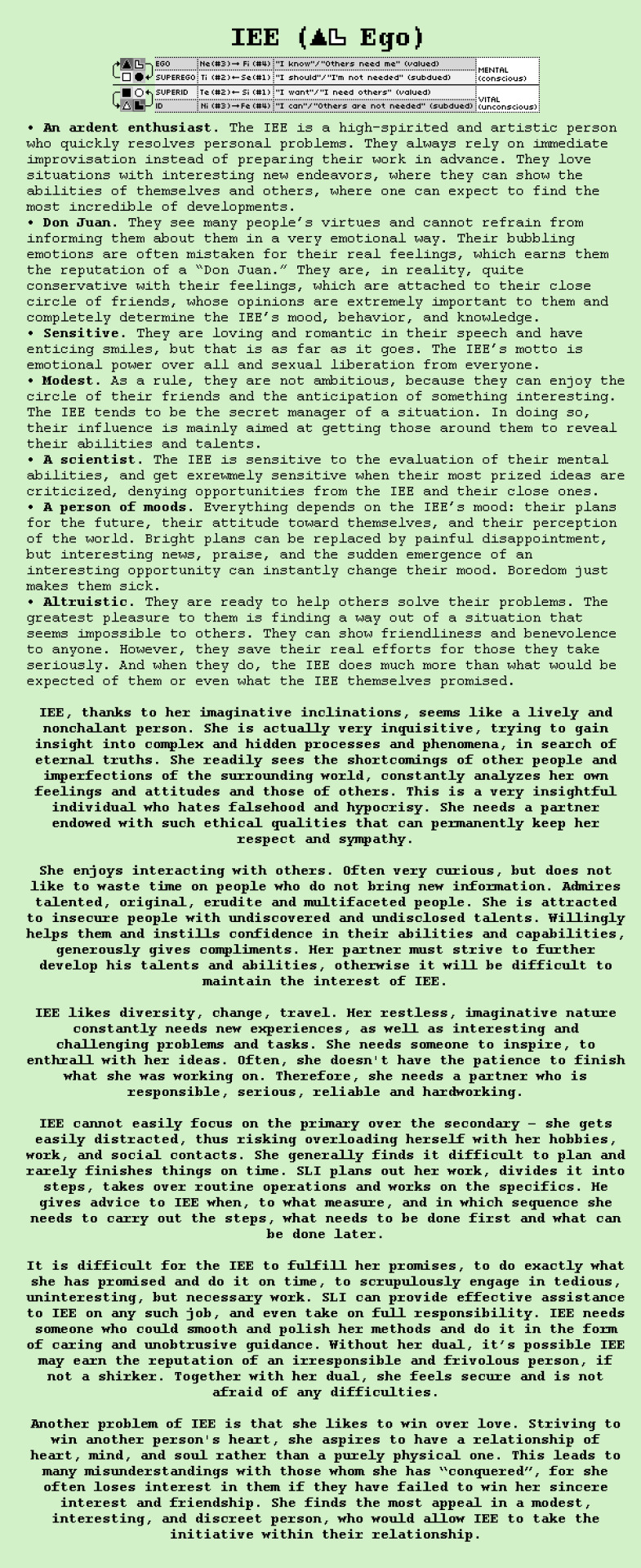
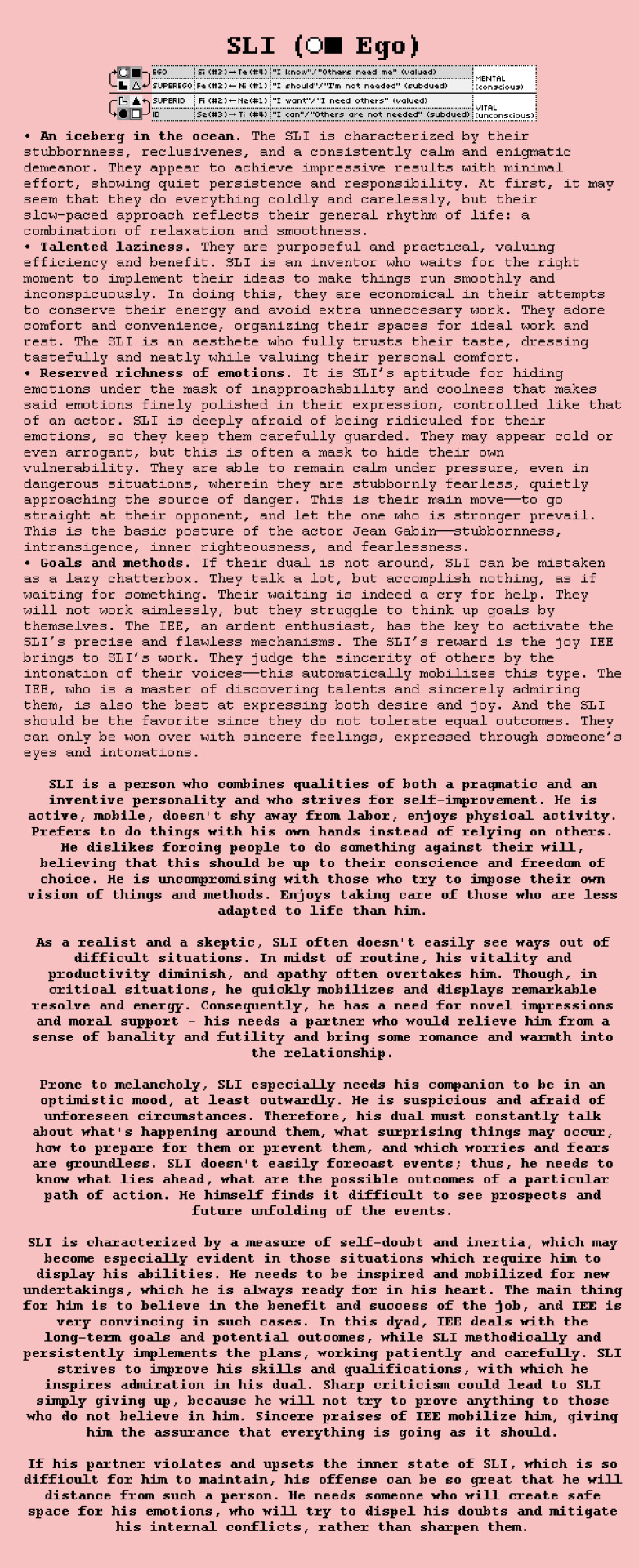
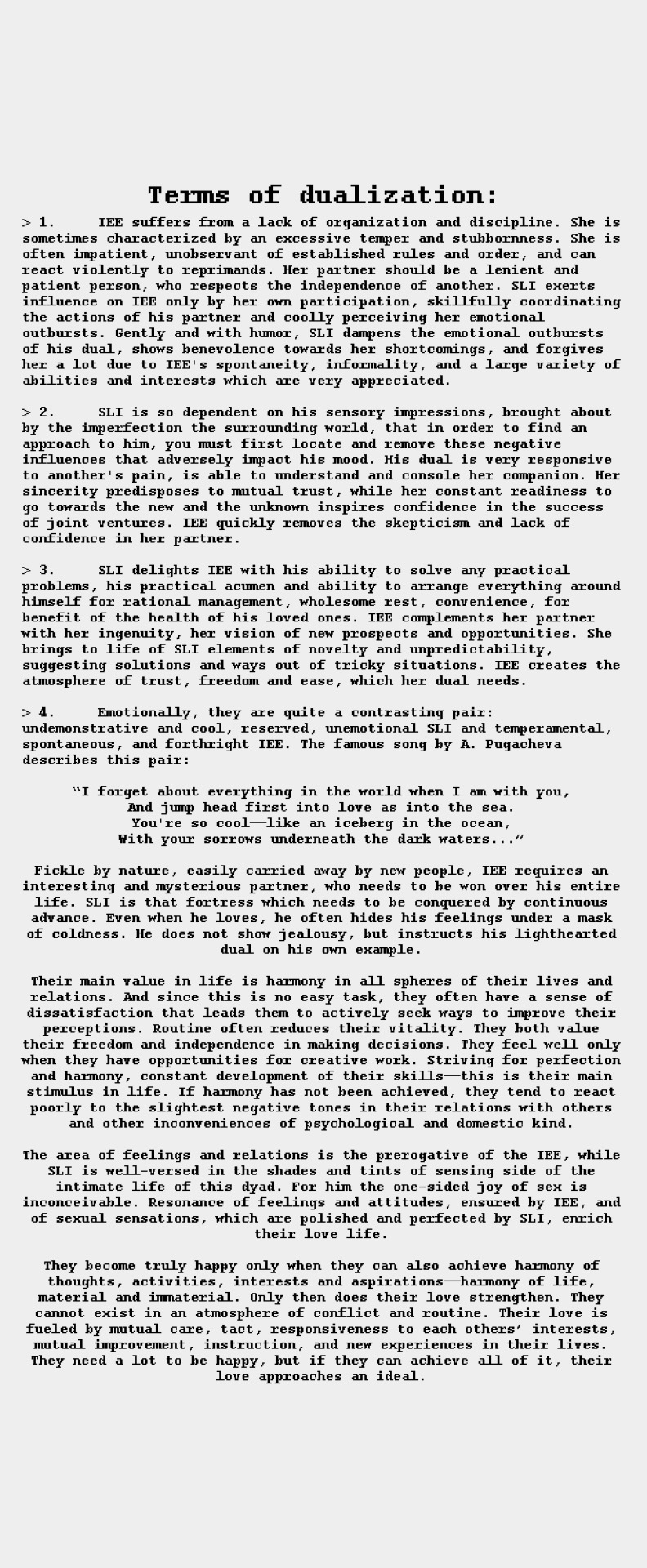
fittingly with that, as ouroborista writes about the opposite space-time aspect dichotomy,
Space and Time are the fundamental Aspect pair. Their job is to make shit take place. To create novelty. Between them they span not only all of existence but also the inseparable twin approaches of any creative project. Space goes for breadth, for ideas, for expansive, holistic input, while Time goes for needlepoint focus and a rapid-turnover ability to pull through on the prompt. There’s a reason why these are the two Aspects necessary for any successful session of SBURB.

jade is literally always having a little giggle about him. dave is a funny guy. lame court jester ass boyfriend
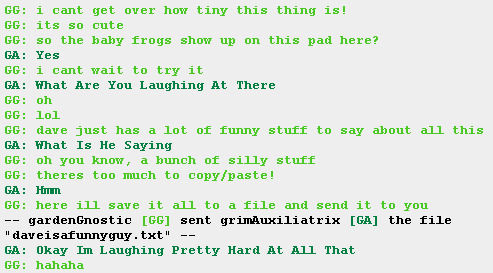
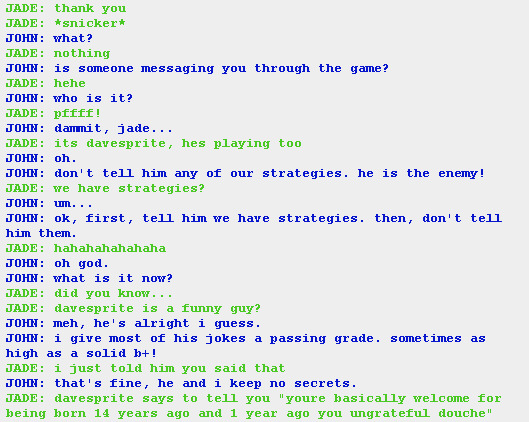
he’d draw his post-ironic fursona and show it to her with the usual deadpan expression on his face, eyes obscured by his shades. but jade will look at it and when he sees her smile and laugh it makes it all worth it. his cheeks feel warm and he’ll smile slightly like “heh heh”. dave the type to smile like an idiot over anything jade does like his mouth keeps making a thin line and hes trying to fight it but . Jade
dave thought jade looked absolutely stunning in her 3 in the morning dress his mouth probably stupidly hung open the tiniest amount seeing her after swapping into it
of course she only wears it for what she considers "very special occasions"…..spending time with dave seemed to be a very special occasion :)
jade think dave looks sharp in his suits!!
imagine jade adjusting daves crooked bowtie and lapel and his palms start to sweat and he darts his eyes from behind his shades and chews the inside of his cheek she making him nervous bro 💯
jade is definitely the teaser and dave is the teased. still i dont think jade teases dave as much as john and rose which is why he feels more comfortable opening up to her about his shit. her teasings are much lighter and inconsequential
despite how funny and informal he is dave is a classy well-put-together romantic. he is responsible and harmonious in how he choses to present himself. remember when he got secondhand embarrassment from rose when she was drunk before her date with kanaya and he suggested to her and kanaya that the two reschedule? … he’d NEVER do something like that. sober. suit is ON. hair is neatly combed. he is right on time, not too early not too late, and his first words are “yo whats up”
dave has this designated driver energy about him
after dogtiering jade’s dog ears can perk and flatten, adding even more expressiveness
jade has so many hobbies and interests i think she’d get dave into horticulture somehow unironically
theyre both the kinda mf to ask “would you still love me if i were a worm”
dave’s hands are warm
jade’s skin can be cool to the touch in some places like the back of her arms or shoulders and dave places his hands there to warm them. or by rubbing them or something
idk just some associations space is cool and time is warm to me. the vaccuum of space is cold and time is associated with gears which are associated with generating heat and dave’s classical element is fire and jade’s is earth and her planet is initially covered in snow and daves is covered in lava idk…. just makes symbolic sense i guess but its also cute in its own right
dave would love going to the beach with jade on earth c cause the ocean is so boob i mean boob i mean boob i m,ean boob i mean SHIT . blue. blue
this Fucking animation bro
she infodumps about science and he sits his ass down to listen
jade does this (excuse the fact that the url is roselalonde)
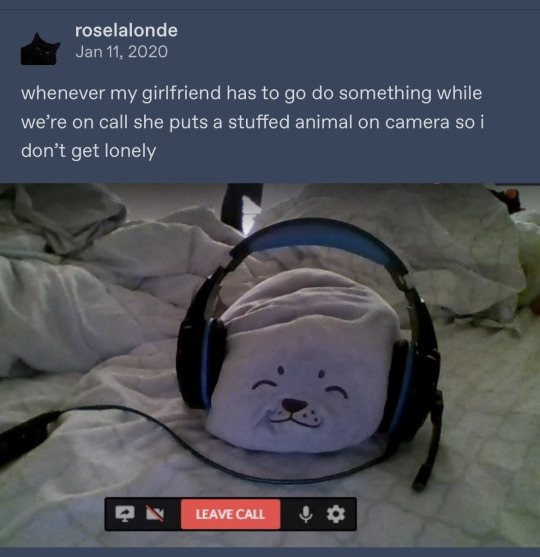
208 notes
·
View notes
Note
I blame this one on watching too many racing movies recently, but Racecar driver Hob and nepo-baby Team sponsor Dream.
Dream somehow (he suspects Desire) becomes the representative of the Endless Corporation for the racing team they sponsor. It is Dream’s idea of hell, large crowds, loud noises, fleeting seconds of action to watch directly, and then being expected to chat with others while watching the tv screens. He doesn’t know what is happening and doesn’t really care, and it shows. Sure, being in the luxury of the owners/sponsors box helps, but still he’d rather be anywhere else.
Dream eventually heads to the team’s garage with the excuse that he wants to listen to the race engineers and driver directly. Everybody in the garage is too busy doing their job to try and chat with him or pay him more attention than is needed to get him a headset and settled out of the way, so it’s perfect for Dream.
Robert “The Immortal” Gadling is the newest addition to the Endless racing team, so named because he has survived more on-track crashes and accidents than any other active driver, most of them weren’t even his fault. He always says the reaper is going to come for him in a car, so he might as well make it an interesting death. The press thinks he is just a thrill seeker chasing fame. In truth, he lost Robyn, Elanor, and the baby from being hit by a drunk driver while he was driving, and it haunts him. He wants to prove that he is the best driver, because if he is the best and he still lost his family in an accident, then no one else would have reacted faster or handled the car better.
Hob isn’t the best yet. He is always in the upper pack but hasn’t consistently broken onto the podium. He’s hoping this new team will be a chance to really show what he can do. Hob always has a running commentary going on the team comms no matter how long or intense the race is. People constantly have to break into his chatter to give him the information he needs about the car, his competition, or track conditions.
Dream is intrigued by this man who constantly jokes around while driving a heavy death machine around at break-neck speeds. They end up talking a few races later when after the race Dream stays long enough for Hob to notice a new face in the garage. Dream finds he enjoys having all that intense focus on him alone. Chats after the race become drinks out, then become dinner together. Soon, they are exploring the cities the races are in together when there is downtime. Eventually, they end up testing the structural integrity of Dream’s hotel’s beds as Hob sets out to prove that he is an athlete in peak shape thank you very much.
Poor Dream who has never had a healthy relationship in his life is insistent that what they have is a friends-with-benefits or fuckbuddy situation even though neither is looking elsewhere, they are always talking to each other and they’ve both shown each other the skeletons in their respective closets. Hob would like to call their relationship more but also knows his constant dance with death or at least serious injury is as good a reason as any for Dream to avoid any kind of commitment to him not counting both their emotional baggage.
Things come to a head when Hob is caught in a multi-car crash and is sent rolling into the center of the track where the car quickly catches fire. Dream pushes himself into the pack of people from the team following the first responders to the crash, hoping that the safety gear the team poured some of the sponsorship money into actually did something. He isn’t allowed on the medical helicopter when Hob is airlifted out, but he does set some speed records of his own getting to the hospital.
The safety equipment does its job and Hob will only have to miss a few races for recovery, but Dream is not letting Hob go one more day without formalizing their relationship because no one else gets Hob, not even Death. Hob’s memory of that first “I love you” is hazed by painkillers, but they exchange the words so many times during his hospital stay that he isn’t too worried about it.
When he is cleared to begin racing again Hob starts consistently placing on the podium and each time he makes sure his boyfriend gets caught in the champagne spray no matter how much Dream grumbles about the cost of cleaning his designer clothes. Years later, when Hob retires from being a driver so he can spend more time with his husband, he is considered the chattiest driver of all time, Dream listened to every single one of his races after all. He also incidentally will be remembered as one of the best drivers of his generation.
-💥
I know close to nothing about racing but omg I am so here for this!!! Driver Hob!!! Chatty, risky, charismatic driver Hob with a tragic backstory!! I love it, once again I can only thank you for honouring me with this mini fic <333
I love to imagine Hob doing press conferences and managing to turn every answer for every question into a rant about how amazing Dream is, he loves Dream so much, he never thought he'd be able to get to the top of his sport but Dream has given him the motivation. And Dream himself is standing at the back of the room desperately wishing that the floor would swallow him up <333
114 notes
·
View notes
Note
Personally, I agree that TKB has every right to feel anger and take action to prevent the tragedy of Kul Elna from happening ever again. But the second he says "I'm going to work with a demon to destroy the entire world" is when I put my foot down, because that makes him no better than what the ruling class did to him; it makes him worse because he's inflicting that to other innocent people. Neither Atem and TKB are completely correct or wrong, but the story siding with only Atem is morally iffy
-TKB isn't a real person independently arriving at moral actions, he is a character in a narrative whose structure and characters are consciously designed by human beings to tell a particular story
-Saying "Well, TKB was still evil because he wanted to destroy the world" is accepting the premise of the narrative and TKB's motivation as if it sprung forth from the ether, ever-extant in its present form and incapable of being written any other way
-The narrative of MW paints a portrait of a world that is visibly and systematically unjust and whose domestic and military power is derived from the literal death and exploitation of the poor; it then has a character, TKB, make very deliberate criticisms of this system, and puts them in direct contrast with Priest Set and Akenhadin's own ongoing corruption.
-Since again, this is a story being crafted with intent, this contrast directly leads audiences to conclude that TKB's criticism is valid, and the author intends us to reach this conclusion and has deliberately set up his commentary. Determining that TKB is right about the monarchy is the logical conclusion of the facts and narrative tools we as the audience are given.
-However, instead of leading us to a satisfying conclusion based on this setup, the story instead tacks on "...but he wants to destroy the world, so we can kill him!" and never meaningfully addresses the questions about good and evil or the nature of the throne, nor does Atem ever have to really face them. It disposes of TKB and quickly sets about putting a heroic coat of paint on a mostly unchanged Set and reducing everything to a quick and tidy good vs. evil shonen fight scene, contradictions be damned.
-The problem with this plot twist isn't fantasy-monarchism. It's that it is actively disorientating. We as readers have been told in loud, bold letters for over two dozen chapters what this story is about and what message it's trying to communicate (a very powerful one, based on how passionate people become about it!) and the story simply...dumps it all, and starts pretending to be a totally different story. Like none of that earlier stuff mattered and we should suddenly be content with power-of-friendshipping the bad guy into dust.
-Tongue-in-cheek declarations that "TKB was right!" aren't moral statements about TKB or Atem's actions, because Thief King and Atem aren't people, they are characters--a narrative tool the author is using to tell a story. And again: the narrative is telling us that TKB is right and the monarchy is troubled and unjust. Vocal declarations that Thief King was right are really an expression of disgust for a clumsy narrative betrayal. "MW told me this excellent story, got me invested, very deliberately set me up to draw these conclusions about the story it was telling and the message it wanted me to get...and then tacked on the ending for a completely different story that had nothing to do with any of that! This is bullshit!"
-If TKB were a mere generic evil, who intended to destroy the world for his own gain and had no compelling criticisms of the hero's world or complex tragedy, he wouldn't be anywhere near as interesting (see: the anime, which did almost exactly this), but I don't think people would be half as worked up about it. It would be neat, at least, because if everything is a fantasy good vs. fantasy evil from the start, then at very least the story would match its ending. No one would feel misled or disorientated.
-But the story did ask moral questions of our characters, and it did so carefully, deliberately, and with fireworks; it is therefore culpable for failing to even attempt to have them answer them.
-At the same time, the trope of the "rebel turned murderous extremist" is well-worn and troublesome. There are ten thousand examples. A villain who challenges the status quo, who takes issue with real problems, revolutionaries and rabble-rousers with righteous fury...but they want to, uh, kill innocent people also! for some reason! which is why our heroes (defenders of the status quo) need to get rid of them and we don't need to listen to what they are saying!
-Why does fiction so frequently depict people angry about real societal problems, and who act to change them, as people whose legitimate complaints are inexorably tainted by tacked-on inexplicable violence?
-Who benefits when fiction frequently conflates righteous criticism of injustice with supervillainy? When fiction conflates heroism with stalwart defense of the current system? How do we carry these narratives with us into the real world?
-You are criticizing Thief King as if he were a person. I'm not, and I'm not interested in doing that. I am criticizing the poor formulation of a story.
-anyway. TKB did nothing wrong
176 notes
·
View notes
Note
Apologies if you've answered this before, but I've been following you for a while and the way you approach literary analysis is so interesting, and your takes have made me reflect on and reconsider the way I approach a text and how to respond to it! So I wanted to ask: when you read other people's takes/analysis for a particular piece of media, how do you determine if it's good or not? And not in a way where you decide it's "good" in the sense that the person you're reading has uncovered the One True Interpretation you could get out of that piece of media, but in the sense where you feel like it was worth your time, and hit the spots that you're looking for in particular when it comes to media analysis.
I'm asking because I've taken to reading more media analysis and commentary online a lot more nowadays, and sometimes I'll read something I'm not quite satisfied with but can't exactly articulate why I feel that way. I never know if it's in the particular language used or in the length, or in the details, because frequently I find that at the end of my reading I don't even disagree with the take or its premise, which makes my dissatisfaction all the more confusing. So I do like hearing about how other people approach things to try and figure things out for myself, and I respect a lot of your positions, so. How do you do it?
Thank you! I feel like “good/bad” is a very broad framework to be using here; I wonder if it might be more helpful to come to conclusions about analytical work based on how useful you found it. There’s a lot of critical work that I consider to be completely useless to me, but that doesn’t necessarily make it ‘bad’ or even ‘wrong’; it’s just not doing what I want it to be doing. Some questions you might want to ask could include:
Is this elucidating? Does this explain what it purports to explain, does it answer the questions it wants to answer and/or pose new questions that weren’t immediately legible in the text? Has it developed an idea clearly? Has it given you some new angles from which you can think about the text? In short: did you get something from reading it?
Is the argument followed to its furthest possible conclusion? What I mean by this is like, media analysis is often a process of asking a lot of “why” questions: why is X like this? Why is this significant? Why X and not Y?—over and over until you run out of questions to ask. I think the big thing to watch out for here is whether or not a piece of analysis lays out its observations as though events, characterisation, relationships, etc., are phenomena emerging organically (as though it were “real life”) rather than being narrative choices made with intention (and some impetus towards figuring out what that intention is). Saying that X character is like Y is far less compelling than saying X character is like Y because Z when Z is an argument that extends beyond the boundaries of the narrative itself. Narratives are a series of deliberate choices; we want to know why those choices were made and whether we agree with them.
To give an example: let’s say we’re talking about the significance of Shiv’s pregnancy in the final episode of Succession. Following it through to its conclusion might look like this:
I start out by saying, “Tom being favoured over Kendall as CEO of Waystar is in part due to Shiv’s pregnancy reaffirming the Roy family bloodline, something that Roman establishes Kendall as being functionally incapable of doing.” The first question we should ask here is: why is reaffirming the bloodline significant?
From here we can say, well, we know it’s significant because Roman uses the word ‘bloodline’ to mark Tom/Shiv as favourable, and this tells us that there is a logic of eugenics running through Logan’s empire. This is good, but we’re still operating in wholly diegetic territory ie. the only terms we’re setting for our argument are those of describing conditions internal to the narrative. The next question we’re asking is: why are the Succession writers bringing this question of eugenics and bloodlines into play here?
From here, we can go in a bunch of different directions—for argument’s sake, we can think about Succession’s relationship to imperial/monarchic narratives of dynastic succession crises and how the show generates tension in part by transposing those narratives onto an American capitalist media empire in order to suggest that networks of capitalist hegemony and the means by which such a hegemony is sustained can be discursively linked back to such dynastic interplay. We might then point to eg. Caroline and the British aristocracy and this question of blood purity that Logan’s relationship with her + his discarding of Connor introduces; can we think about the British imperial aristocracy as a crutch on which American capitalism rests, or are we being asked to consider how these imperial superpowers are a) functionally interchangeable and b) mutually sustaining, or? We can look at the fact that Sophie Roy is brown and Iverson is implied to be autistic (and obviously the fact that neither is biologically related to Kendall and the suggestion that social ‘inferiority’ is therefore hereditary) to identify whose bloodline a practice of eugenics within hegemony seeks to retain and who it seeks to dispossess, and how this links back to the willingness on the part of the siblings to collude with (or even openly support) a fascist when it becomes in their best interest to do so. We can ask questions about reproduction of the bloodline as a means of reaping the rewards of hegemony (Shiv) or punishment within the borders of said hegemony for impotence and sexual deviance (Kendall and Roman). All of these lead us from arguments about the internal conditions of the Roy family towards conditions of the ruling class articulated through the family structure. All of this is compelling, but it begs the question of: why are we able to extrapolate all of these conclusions from the narrative configuration of the Roy family? Where in the text is it evinced that this kind of metonymic reading is coherent?
Finally, we link this back to Succession by understanding the Roy family as effectively metonymic for the ruling class as a united body (and why it’s effective for a family unit to take on such a metonymic role! What does this tell us about the relationship between the cluster of kinship relations we call the “family” and hegemony?) as is pretty transparently evinced throughout the show, and which is what gives meaning to this series of observations and allows us to extract an argument towards thematic significance out of what was initially just a set of observations about what was ‘happening’ on-screen.
I hope this is a clear example—I just went with it because most people on this website are at least passably fluent in Succession by now, lmao. The point is, you keep asking questions until you’ve followed the throughline through as far as it can be followed. In evaluating a piece of critical writing, you always want to be asking: why is this there? Why is this important? A weaker piece of critical writing will often avoid or else seem not to consider these sorts of questions. As a general rule of thumb, the more a work of critical writing seems to take for granted, the weaker it tends to be.
How well does the argument match the expectations you might have? Is this line of interrogation something that you’ve considered before, and what conclusions did you draw? Does the argument fall in line with your conclusions; does it challenge or develop them by introducing something you hadn’t considered, or do you think that your understanding identified something that the argument missed? If you were asked the question that the piece purports to respond to, how would you respond?
What are the blind spots of the argument? This is similar to the above, but is specifically concerned with asking what the piece might have missed or what assumptions might be limiting its scope. This means looking for the assumptions upon which the argument rests and trying to unpack and challenge them in order to understand how they took the form that they did. An example of this might be the kind of “female rage”/“teenage girl ferality” arguments you often see circling about Yellowjackets: what narrative does this idea of girls’ youthful ‘rage’ implicitly exonerated from harm contribute to? What do we do when we reify the idea of ‘teenage girlhood’ as a unique, impenetrable state that affords those who ‘experience’ it a uniquely elevated condition, or when we flatten these characters into the apparently equalised category of ‘teenage girl’? How do these arguments elide questions of race in Yellowjackets as regarding eg. Lottie or Taissa, and how can we follow them through to think about blind spots not only in the argument but in the show itself? No argument can feasibly encompass every possible nuance and perspective that one could bring to a text, obviously, but a stronger piece of critical writing will try to get into these underlying assumptions with depth and thoughtfulness and try to put some work into showing why they came to the conclusions that they came to; again, it’s about what gets taken for granted, what the writer presumes can go unspoken, and whether we ought to drag it to the surface and take a better look at it.
How well is the argument substantiated? Here I would expect reference to the source material—how well are these references selected? Are they consistent? Is there some cherry-picking happening—can you think of a point in the text where the claims being made might be challenged or contradicted? Does the argument impose stasis or unilaterialism onto something that in the text is in fact depicted as dynamic or otherwise in development? How well does this hold up with your interpretation of these moments—can you interpret them differently? What do you make of that ambiguity?
Can you place a value judgement on the argument made? In other words: do you agree? This is basically just about synthesising your responses to all the other questions and evaluating how on the mark you think the argument is; how you would respond to it, how you might develop it, how it might have developed your understanding of the work or else can be applied to other parts of the text (or indeed, other texts).
Ultimately I think the best thing you can do here is develop your own positions on texts to the best of your ability—I find that writing my arguments out helps me to get to grips with them better—and engaging with analytical work relative to that, ie. going in with your own solid sense of understanding from which your response can be crafted; I have an older post here on some of the questions you can start asking when you’re looking to do so. Obviously this means keeping an open mind towards arguments that contradict your own or that you may not have thought of before, but knowing what you think and why you think it will make it a lot easier to notice what might be missing or contradictory in someone else’s work (or, again, what you yourself might have missed). Critical work is (imo) best thought of as a dialogue rather than a straightforward imparting of knowledge; how someone else’s analysis informs your own, and how yours informs theirs, without flattening this dynamic into a deference of superior authority on either end, is the clearest and most productive way to think about it all.
I hope this is helpful!
240 notes
·
View notes
Text
Love and Redemption: A Fantasy Epic About How Prejudice Destroys Worlds, and How Love Pieces Them Back Together
**major spoilers for: Love and Redemption

After wrapping up a watch-through of Mysterious Lotus Casebook, my mom had the brilliant idea that we should rewatch the work that launched Cheng Yi to fame (or at the very least solidified him as the man to hire if you need someone to spit blood): Love and Redemption.
I’m certain she only found this idea appealing because she doesn’t remember a TV show after it’s over. Credits rolling? Aight, time for the woman to clear up space on her brain’s memory drive. Meanwhile, my life flashed before my eyes as I recalled the anguish that’s synonymous with the show’s plot. But you know how things go when your mom wants something. If she says you're sitting through 44 hours of emotional torture with her, then you plant yourself on that couch until it’s over.
Ironically, Love and Redemption fares even better on rewatch. Though other xianxias have come close to its place in my heart, I’m now concerned that my palette won’t be so easily satiated again. It’s got your conventional reincarnation, warring realms, and a star-crossed romance while throwing curveball after curveball to shatter your expectations. Complex characters, too? An endgame villain who will haunt you in your sleep? You can’t ask for more.
Just because you didn’t ask, doesn’t mean that the show won’t deliver something extra. I like to think that nothing reflects a society’s unsightly reality like a well-done fantasy, and this one hits closer to home the more time that passes. A thinly veiled commentary on human flaws and how difficult it is to be a good person, Love and Redemption is a drama for the ages.
This is going to get lengthy, so to prepare you, here’s how I’m divvying up this piece:
Part I: All of Them Are Classist
Part II: All of Them Are Sexist
Part III: All of Them Are Racist
Part IV: Love Wins All
---
Part I: All of Them Are Classist
It’s not my intention to disgust anyone right out of the gate, but we need to talk about Wu Tong. Do you hear what I hear? Yes, it’s the distant echo of Wu Tong’s nefarious laughter, resounding between the walls of my skull.
Quite simply, Wu Tong is the worst. (Or at least he would be, if it weren’t for that other fellow named Bai Lin. That dude will get a glaring spotlight later in this essay, trust me.) But it’s not for no reason.
Coming from a background of poverty, Wu Tong spends most of his young life trying to prove himself to upper class cultivators who don’t have any interest in who he is, only in what he has to offer them. He earns his place in his sect through relentless hard work. He utilizes unsportsmanlike methods in his attempts to win the battle tournament in opening episodes. It's not just a competition to him—he's directly told that if he gets anything other than first place, he can forget about keeping his place in his sect.
When he and the protagonists first meet, his prideful personality results from his inferiority complex. There’s no doubt that he’s a powerful cultivator, but the issue is how he finds that to be his only real value. He doesn't bother to be likable, because what's the point in doing that? Being likable doesn't fill an empty stomach. But the more he disrespects others in an effort to make himself appear important, the more others look down on him, and the more he overcompensates by fighting back even more. It’s a vicious cycle—one that never ends because no one involved wants to take the first step back.
Knowing what type of person he becomes, it’s hard to pity him in any capacity. However, it would still be unfair to ignore how others mistreat him before he even turns into a true enemy.
One scene that sticks out to me happens early on, where Wu Tong nearly injures Xuanji during a 1v1 battle against Minyan. The protagonist crew insists on getting payback. Okay, I’m with it. You can’t let such reckless violence slide. I guess they’ll get their revenge in a later stage of the tournament by beating him into the ground?
Nah. That would be too reasonable. What they actually opt for is tricking him to fall into a trap by putting up a “have you seen my lost snake?” poster with a financial reward, knowing that he’ll be fooled because…he’s poor.

Sifeng: I asked around. Wu Tong was born to a family of lower status. He lives frugally. The reason he trains so hard is because he hopes to become someone powerful one day. […] Now he needs the money urgently to buy medicine and recuperate his inner strength before his next battle.
Minyan: When you put it that way, doesn’t that mean he has no choice but to come for the ten night pearls?
Sifeng…oh no. Not you too.
The way Wu Tong behaves doesn’t warrant anyone being amicable toward him. I, too, have a nonexistent tolerance for obnoxious, violent egoists. But if later episodes are any evidence, this scene foreshadows that two wrongs won’t make a right. If they want to teach him a lesson, they shouldn’t stoop so low as to take advantage of his poverty. His family background is the one thing about him that isn’t his fault, yet it’s the one thing they choose to use against him. That’s what I call “going too far.”
Now that he's been hit where it hurts, Wu Tong feels justified in going too far himself. In a fit of desperation and contempt prompted by his master abandoning him, he stabs Xuanji. Not great. Things get extremely not great when you remember that Xuanji is the daughter of a sect leader. That quickly transforms Wu Tong’s attempted murder/almost manslaughter into the evilest act known to mankind. All five sects turn against him to hunt him down and kill him. I’m no law or philosophy expert, but I’m pretty sure the punishment for almost manslaughter is not the death penalty.
The five sects can treat him as their prey because he doesn’t have a support system to counter them. If he were the son of another sect leader, the thought of killing him would never even have entered their minds. Targeting him so relentlessly has less to do with justice and more to do with exerting power over a lower-class young man who hurt someone infinitely more “important” than him.
That imbalance between crime and punishment is what pushes Wu Tong over the edge. He goes on the run for several years before officially succumbing to the call of evil, after which he becomes truly irredeemable. Still, you’re occasionally reminded of his struggle—is he destined to be a villain? Or is throwing aside his remaining morality just his best chance at survival?

Do you have any idea how I survived these past several years, when you were all trying to kill me? What did I do back then that was so unforgivable? Did your sister die? Was it warranted for all five sects to team up against me, an average disciple? Was it warranted to back me into a corner over and over again, to force me to claw out of hell? Open your eyes and look at me! These past four years, I’ve already died countless times. Every time, I clawed my way back out of hell. Five hundred taels? You want to take my life with a measly five hundred taels? Don’t look down on me. Touch here. I have a fake leg. That’s what your five sects have left me with. What’s that look of yours? Guilt? Pity? I’m not telling you this for you to pity me. I, Wu Tong, survived this far because I must have my revenge.
Something my mom likes to say is if you find yourself going against someone—but especially a dangerous person—you must leave a path for their survival. It’s less for their sake than it is for yours. Should you eliminate all their options, they’ll have no choice but to bite. And they’ll make sure it hurts like hell.
As an impetuous teenager, Wu Tong is in the wrong. He needs to be taught that his actions are unacceptable. But that can’t be accomplished by putting a bounty on his head and demanding that he be murdered. That’s how you turn a scoundrel into a monster.
Minyan, Wu Tong’s foil, similarly doesn’t come from an optimal background. An orphan, he was taken in by the Shaoyang Sect without the obvious pressure that Wu Tong suffers. Even so, he can’t escape the innate inequality that seems to exist between him and his fellow disciples. It especially affects him because he’s in love with Linglong, Xuanji’s sister but more importantly…also the daughter of the sect leader! Poor guy.

When I was little, kids in the village would surround me every day and call me a bastard child with no parents. I could only pretend that I didn’t hear them. Because if I took it to heart, they would only ridicule me more. We can’t shut the mouths of people who want to slander us. But we can choose not to listen.
He may think that he’s past it, but later episodes see Minyan being manipulated using that exact insecurity. It’s easy to impersonate his master and nudge him to become a “spy” in the enemy base because he’s compelled to prove himself worthy of the sect and worthy of Linglong. Fake Sect Leader Chu Lei tells him:
When I first met you, you were only eight years old. You were homeless on the streets, starving and shivering. Still, you clung to your family dagger and refused to pawn it. In that moment, I knew that you were a child with an iron will. That’s why I’m here to find you today.
I can agree that Minyan is really stupid to immediately believe that his master, a guy well-known for pretending to do important things more than he actually does them, would tell him to do something as reckless as invade enemy territory. However, he also heeds the impostor’s instructions because realistically, his master asking him to prove himself is something that could happen. Any good disciple would naturally want to repay their masters for their favor, let alone a disciple who would otherwise have nowhere else to go.
The contrast between Minyan and Wu Tong shoves itself in your face as you watch, primarily through their respective relationships with Linglong (well, one of them has a relationship. The other is a creep. Can you guess who’s who?). Without family backing, the two men both struggle to find their place in the world, but they’re complete opposites purely because of their upbringing. Thankfully for Minyan, he found a family amongst people who don’t treat him as “another,” even if he may think of himself as such.
Wu Tong isn’t so fortunate. You can say it’s his own doing, a result of his terrible personality, but he certainly wasn’t born like that. And now someone will pay for it.
---
Part II: All of Them Are Sexist
As a caveat, I’ll mention that the main cast really could have used a woman who isn’t some combination of foolish, lovestruck, and/or loud. But I’m willing to overlook it just this once because the writers excel in highlighting both the ladies' flaws and how we as an audience exaggerate those flaws through our own preconceptions.
Working backwards in terms of plot importance, we can start with Xiao Yinhua. Sifeng’s snake familiar in a human form, Xiao Yinhua is like most female leads from the turn of the millennium in that her only real strength is throwing temper tantrums. She’s also like most second female leads from the turn of the millennium in that she constantly prefers using underhanded tactics and harming others to achieve her goals—in other words, a snake. Oh. I guess that makes sense.
Her affections toward Sifeng cloud her already nonexistent judgment and prompt her to make some of the worst decisions made by anyone, ever. At first, I thought I was being unfair toward her because of my own internalized misogyny. But no. I can say with absolute confidence that I would abhor this character no matter what gender or creature or object she may be. She has no redeeming qualities aside from teaching us that someone foolish, lovestruck, and loud is doomed to self-sabotage. From that perspective, she’s still a valuable character to have because now we know that before we act, we should think: would Xiao Yinhua do that thing? If she would, do not do that thing.
If Xiao Yinhua were willing to grow up, she could become more similar to Zi Hu. Zi Hu almost acts as a parallel to Sifeng—hopelessly in love with someone who doesn’t return the affection for a literal thousand years. Also, both are very pretty. Ahem.
Zi Hu’s thousand years’ worth of experience gives her the skills to back up her unrelenting feelings for Wu Zhiqi. She’s a rarity in that her driving force is a man—a motivation that's typically a reputation ruiner for female characters—but you find her lovable instead of thinking that she lacks self-respect. The key is that her love isn’t blind and rash like Xiao Yinhua’s. Zi Hu has a plan to save Wu Zhiqi from his prison and she carries it out with intention. In other words, it’s okay to focus on love, but only if you can take responsibility for your feelings.
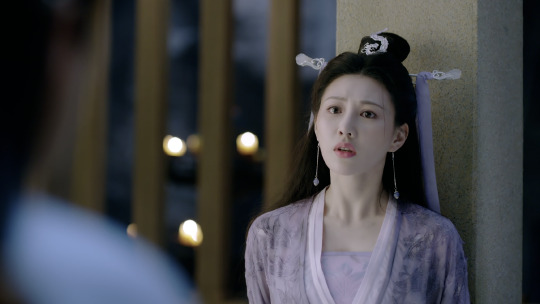
Ting Nu: Why go so far? When did Wu Zhiqi ever tell you that he loved you? Your affections are merely one-sided.
Zi Hu: When did he tell me he didn’t love me? Look, once I rescue him, he’ll have to be with me to thank me.
Because Zi Hu is a literal fox, people suspect her both for being a demon and for being the demon notorious for seducing men to consume their souls. The latter is quickly debunked and becomes less of an issue than her just being a plain demon. I nonetheless find it hilarious how everyone balks when she shows them her harem of men gleefully living in her backyard. Yep, she’s a cunning vixen. You can just keep wishing you could join that harem.
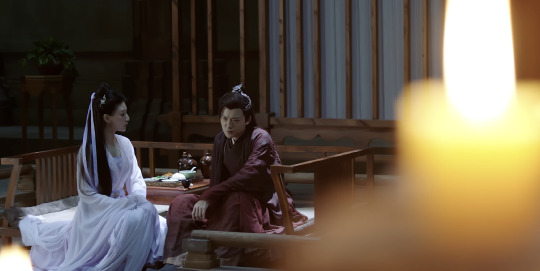
Zi Hu: You're trying to shoo me away. You think I’ll storm out because of your petty tricks? You’re underestimating me. I’ve already decided, starting today, I’m going to follow you everywhere. Even if you don’t want me to, I’m going to cling to you. This old spirit isn’t going to let those thousand years of waiting be in vain. Wherever you go, I’m going with. If you dare sneak peeks at other pretty women, I’ll dig out your monkey eyes. All in all, if I’m around, no pretty woman can enter your vision. As if you could bear to leave me behind if I hang around for another thousand years!
Xiao Yinhua and Zi Hu aren’t overly victimized based on their gender within the show itself. For the better too, because whoever dares to do so would probably end up dead by a fox's claws and a snake's teeth. These two characters' existences test your innate view of female characters instead. What is it that matters to you in a female character? What standards do you hold against them?
(**Content warning for the below segment until the next purple break: brief mentions of sexual assault and suicide.)
And that's where we come to Linglong. Linglong is a loudmouthed spoiled brat. She's overbearing, and while she wants to protect Xuanji, her method of doing it is by crying crocodile tears and throwing temper tantrums in front of their father. No wonder she and Xiao Yinhua clash—two childish people who both have a compulsion to win arguments? Forget it.
A bulk of the drama sees Linglong’s primordial spirit being taken and held captive by Wu Tong. Wu Tong puts half of her primordial spirit into the body of a flower demon, whom he also forces to take on Linglong’s physical appearance. No other reason, he just wants to have his way with someone who looks and acts like Linglong, the person who jeered at him all those years ago. By the time the real Linglong recovers her primordial spirit, Wu Tong has done enough damage that she’s haunted by nightmares and memories of someone who assaulted her when she couldn't even fight back.
The lead-up to this arc is incredibly disturbing and takes root in the very first episode. On my first watch-through, I thought their relationship would take a classic enemies-to-lovers path. The directors and writers pull you in this direction with no subtlety, showing a smitten Wu Tong when he first lays eyes on Linglong. They then keep the scam going by having him act out in awful ways as he attempts to gain her attention. That’s right, it’s the brainwashing girls receive when they’re on the playground: “he pulls your hair because he likes you."

During their first meeting, Linglong is surrounded by a halo filter from Wu Tong’s perspective. Knowing what he’ll later do to her makes the seeming innocuousness of this scene revolting, but it's necessary. It's the first of many steps to prove that someone’s “affections” can’t be used as an excuse for harming whomever’s on the receiving end of them.
Linglong can be an extremely annoying person. Her outspokenness and difficult temper shape her into an unlikable character, which then ensures that by the time Wu Tong captures her, the audience almost instinctively wants to say that it’s her fault. We all know the talk track: “he liked her, so why couldn’t she just have been nicer to him? She asked for it by being mean to him.”
When Linglong first offends Wu Tong, it isn’t for no reason: she’s angry because he endangers her sister’s life over and over again. Admittedly, she goes overboard in her retaliation against him. So what? Linglong being mean to Wu Tong and Wu Tong later targeting her are indeed connected events, but the former doesn't justify the latter. If we say that the five sects hunting Wu Tong down isn’t a fair punishment, then isn’t it also unfair for him to turn the tables on her in such a way?
Essentially, Linglong isn’t the “ideal” victim. That’s what makes her arc all the more heartbreaking. To this day, society wants to find any excuses for the assailant. Any mistake, any flaw of the victim's will be used against her. As humans, maybe it’s instinct for us to hope that bad things only happen to bad people, and victim-blaming is our twisted way of making that an impossible reality.
Overcome with depression and trauma, Linglong is unable to come to terms with what Wu Tong did to her. Men gossip about her and her “relationship” with the enemy, sometimes harassing her straight to her face. Wu Tong himself finds great delight in taunting her about her “sharing his bed,” not only relishing the memories but also enjoying how much it torments her.

Linglong: It was my fault that I was captured by Wu Tong, wasn’t it? [...] Everyone thinks so. I didn’t want to be captured by Wu Tong. But after Wu Tong said all those things, everyone thinks so.
Minyan: Linglong, why care about what everyone else thinks? Just pretend that you didn’t hear any of it.
Linglong: But I did hear them. Why do I need to pretend I didn’t? It’s something that actually happened, so why do I need to play dumb and trick myself into thinking it didn’t? Are you going to be like them too, and mock me?
All the accusations brainwash her into thinking everything is her fault. To Wu Tong and all the people judging her, she’s nothing but a pawn to be used for their own entertainment. And once she and Minyan leave the protection of the sect, everyone finds her an easy target to push around. Hoping that her death will mean freedom for both herself and her loved ones, she attempts to drown herself before being yanked back to life and reality by Minyan.
Linglong’s struggle is many women’s worst nightmare. It’s also a diligent representation of PTSD, something that I normally wouldn’t expect from a xianxia drama. Even after she's rescued and everyone tells her that her suffering is over, it never feels over for her. At night, Lingling is awoken by harrowing dreams of Wu Tong returning to kidnap her once again:

Nightmare!Wu Tong: You’ll always belong to me. You can’t escape.
The conclusion to her arc being Wu Tong’s death and his literal letting go of her may be quite idealistic. But I prefer to think that giving Linglong her happy ending is the writers’ way of trying to assuage our fears, of showing us that there will always be another sunrise regardless of what happens.
(**Content warning end.)
Linglong becomes the drama’s strongest woman-centric plot, and I really love that the writers did it with a character whose personality isn't the most appealing. She's the imperfect woman we can find in every corner of the world, a representation of women overall instead of the minority who are considered "deserving" of justice.
Next to her, Xuanji also gets a short end of the stick. She's constantly being pushed to marry Hao Chen. Every excuse in the book is used against her: they're a fated couple, he's the only one that can take care of her, doesn't she agree that this is a part of her duty? No matter how logically she objects to it, no one really cares what she thinks. If she objects, she’s being headstrong, and that’s the end of it. (More on Xuanji to come in Part IV of this essay.)
And aside from Bai Lin’s more obvious transgressions (we're getting to those), what really irked me is just how twisted he makes the God of War’s rebellion appear in others’ eyes. The logic turns quickly from “Bai Lin must have done something wrong” into “the God of War must have been in love with Bai Lin and grew resentful that he rejected her.” I guess it’s very believable that the God of War would want to destroy the entire universe because some guy wouldn’t date her? That’s right, you can be the most accomplished woman in your field and someone will still want to attribute everything you do to being motivated by romance.
Naturally, the next question is—why is Bai Lin such a weirdo? Why does he insist on turning his friend Luohou Jidu, a man, into a woman when creating the God of War? Hmm. I smell a waft of homophobia...
---
Part III: All of Them Are Racist
And except for a small minority, I really mean "all of them" this time. Humans and celestial beings are racist toward demons. Demons are racist back toward humans and celestial beings. If you asked both sides who started it, they'd point at the other without hesitation. "They started it. By existing."
I don’t even know where to start with this topic. Part of me believes this entire section of analysis could be extraneous—do I really need to do a deep dive when you could just click a random timestamp of a random episode and have a 50% chance of finding a character saying something incredibly racist? No case studies necessary. The drama is the case study.
Obviously, while I may say that all the different races are racist toward one another, some are notably more egregious in their discrimination than others. The five sects, being in power, are the worst offenders. Every other second, someone is reminding another that they need to wipe out demons. Just the utterance of the word “demon” makes them froth at the mouth. In their possession, they have treasure troves of weapons and magical devices whose collective main purpose is to identify and kill demons. Perhaps you know someone in real life who thinks that hating something is a personality trait—that’s the five sects in a nutshell.
Zi Hu and Ting Nu are continuously snubbed for not being human even after they’ve long proven that they’re more help than harm. Ting Nu is a doctor, but even saving Hao Chen doesn’t make them think of him as anything but a demon who is evil in his very bones. Demons can do everything right, but the high and mighty humans are too pure and innocent to associate with them…aside from killing and torturing them, of course.

Highlighted Exhibit A: Sifeng almost being tortured and whipped to death based on the mere suspicion that he’s a demon. The fact that he is one doesn’t matter. His assailants operate on the doctrine that they’d rather kill an innocent person than let a demon roam free. Every action to rid the world of a demon is a virtuous one. It's a reenactment of the Monty Python witch trial but they're being completely serious.
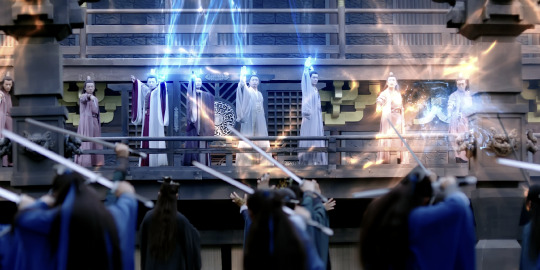
Highlighted Exhibit B: the other sects band together to wipe out Lize Palace without solid confirmation as to whether they’re all demons. They’re operating on the same principle as in Exhibit A, so at least you can praise them for being consistent.

Highlighted Exhibit C: before Sifeng is revealed to be a pretty bird, Xuanji’s repeated defense of him consists of "Sifeng isn’t a demon." The main purpose of these lines is to instill further fear into Sifeng and give him more reason to keep lying to her, all while Xuanji's trust in him deepens. But is it also some of her lingering innate judgment seeping through? A subconscious understanding that her family and sect will never accept a demon as her boyfriend? Well, joke’s on them because he’s one hot bird.
So how are you supposed to survive as a demon? Lize Palace results from the humans’ desire to eradicate an entire race of demons. Just as Wu Tong is driven only by revenge, the demons of Lize Palace just need to survive for long enough to one day remove their masks and live as themselves. Humans’ endless thirst for blood does nothing but fuel demons’ fire of rebellion and keep the wheel of tragedy turning.
As for the “bad guys” of Tianxu Hall? At least when they commit the same acts of evil as the other five sects, they’re willing to admit that being evil isn’t beyond them.
Yuan Lang is an extremely successful villain for this very reason. All of us love Yuan Lang, so much that we start grinning whenever he comes on-screen with his fan and sarcastic mouth. So much that when it's revealed he's been consuming people's souls, all my mom had to say about it was: “Oh. That's mean of him.”
He plots and he lies and he murders, but he doesn’t put up a facade of holding himself to a lofty moral standard. It’s also quite telling that while Yuan Lang machinates behind the scenes, 90% of his time is spent standing by and calling others out on their bullshit. Everyone around him creates their own downfall. He just happens to benefit from their stupidity.
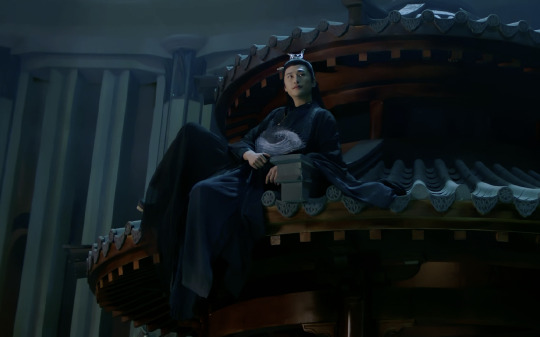
Man with a fan and a plan. I like.
Even so, Yuan Lang isn’t invulnerable to emotion. One of my absolute favorite scenes is where Di Lang sacrifices himself so Yuan Lang can make a getaway. It’s the only instance of Yuan Lang being subject to the pain of caring about someone else. Those short moments contrast so starkly against the sects’ inhumanity that suddenly, a revolution doesn’t seem all that bad.

Behind the bulky mask, his despair is apparent. Man. This actor’s come a long way since his F4—I mean, H4 days. If you've never watched Let's Go Watch Meteor Shower Together, don't.
Finally, we arrive on the topic of Bai Lin. Oh, boy. I still haven’t watched Blood of Youth because seeing the actor’s face triggers my fight-or-flight response. And it’s been years.
Bai Lin, the one racist to rule them all. The guy must have a handbook on “How to Be Racist” or something—how else could the contempt that spews from his mouth, the spark of repugnance in his eyes, and the brazen obstinacy in his opinions be so immaculate?
The entire drama consists of setting the stage for the full reveal of Bai Lin turning Luohou Jidu into a weapon of war to be used against his own people. By the time all the pieces fall into place, you’ve already witnessed the tragedy created by discriminatory practices between mortals. You've seen how Sifeng is targeted and Xuanji forced to move her hand against him. You've seen how the sects use their power to harm instead of help. You've seen how demons plot their revenge for centuries. Once Bai Lin is confirmed to be the genesis of all that, there’s nothing left for you to feel but utter revulsion.
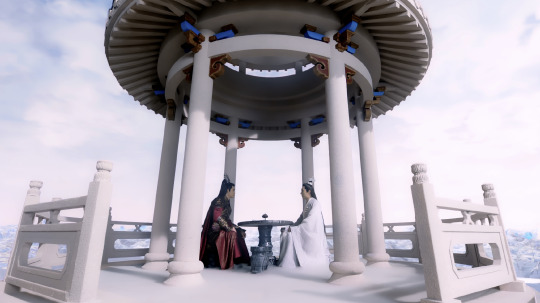
Bai Lin: Celestial beings and demons cannot coexist. How could my Heavenly Realm possibly hold a marriage with the Devil Tribe?
Luohou Jidu: Celestial beings and demons cannot coexist...Then why do you drink with me today? Why are you friends with me?
Bai Lin: Naturally, Brother Jidu, you’re different from other demons and devils. Out of all the demons and devils in this world, Brother Jidu is my only friend.
Can’t believe he even pulls the "you’re one of the good ones" card.
Bai Lin, practitioner of unethical tactics: his ultimate decision to trick and use Luohou Jidu results from racism-induced paranoia. He simply can’t believe that his friend will remain his friend, not unless he becomes "one of us." He thinks the God of War should appreciate that he's given her power and invested his time and energy in her tenth reincarnation, going so far as fool her into thinking that they loved each other once upon a time. Once Xuanji shows herself capable of independent thought, he doesn’t hesitate in turning against her and manipulating her to destroy her own self. He eventually sacrifices the entire world for the Heavenly Realm's survival. After all, what's the value of an entire planet's human and demon population in the face of his power?
He's the representation of what happens when those in power, those who have the best chance of righting wrongs and preventing more from happening, decide to perpetuate the problem. At the same time, he presents the predicament that those we rely on to give us justice are also victims of their own emotions and fears.
I venture to say that Bai Lin is the best-written antagonist in modern xianxia. He’s ruthless but has a moral compass, albeit one that only points in one direction—toward himself. His hubris aside, you have to admit that he genuinely believes he's acting for the greater good. The ends justify the means because he thinks he’s bettering the world.
Bai Lin makes awful decisions that involve genocide and cruelty because he operates on a strict utilitarian philosophy. "I do what I think will bring the best results, even if it means sacrificing something huge in the process." He’s the most dangerous character and the person we should also fear in real life because he’ll stop at nothing to create his definition of a paradise.
It would be easy to dismiss him as simply being a bad person. However, this show draws from reality in that every person exists in a gray area between good and bad. You can lean one way or the other, but you don’t fall completely into either. And that’s the foundation of the show's conflicts. Everyone's so busy trying to define what’s right and wrong that they’ve lost sight of basic compassion.
When he’s finally faced with the consequences of his actions, Bai Lin is driven to despair. He feels true remorse over what he’s done, but only because he’s fortunate enough to actually witness how the thousand-year conflict wouldn't have existed without him. We as people aren’t so lucky—those “what if”s will forever remain in the shrouded realm of impossibility.

Heavenly Emperor: You always thought that evil had sparked in the hearts of the God of War and Luohou Jidu. But the one in whom evil truly sparked was you. All things and happenings in this world are originally empty. From emptiness comes meaning. Yin and yang reverse; they support and restrain one another. The Heavenly Realm was originally empty. The Asura, too, was empty. If all is empty, then how could the Heavenly Realm be superior; and the Mortal Realm, Demon Realm, and Devil Realm be inferior? Your excessive concern for the safety of the Heavenly Realm prompted evil to take root in your heart, unable to be undone.
Seeing him in such despair almost makes me feel bad for him. Maybe I do have too much sympathy.
At this point, it's already too late to repair the damage he's caused, a realization that causes him further anguish. He rids himself of his divinity to show his remorse and accepts death. But he's already caused so much pain to everyone else. Who can put back together the world that he's destroyed?
---
Part IV: Love Wins All
(We love IU for her perfect song that also gave me the best possible final section title.)
As I seek to be conscious of my own biases, I once wondered: why is it that shaking my head at a female character for being dedicated to a man comes so naturally to me, but I can’t be more gleeful to see Sifeng put his heart out on a platter for Xuanji? Perhaps I’m also sexist. Perhaps I have double standards.
Then I thought about it some more and realized everyone loves Sifeng because he’s so blatantly unrealistic that you’re immediately able to sink yourself into his fictional beauty. He transcends gender norms because there is no person of any gender who would go to the extent that he does for Xuanji, nor is there anyone who could remain as levelheaded when faced with some of the most shameless people known to mankind. Forget all the people flying on swords and uttering magic spells. The biggest absurdity in Love and Redemption is its male lead. Yes, I'm a skeptic. But we're so lucky to have him.
Sifeng grew up in a bizarrely backwards environment where—instead of girls needing to cover up to not attract men’s attention—all men need to protect themselves by wearing masks and not associating with the opposite sex. Brainwashed for years to believe that Lize Palace is the only safe space for golden fire birds like himself, he keeps cautious around people while still harboring a subconscious longing for their warmth.
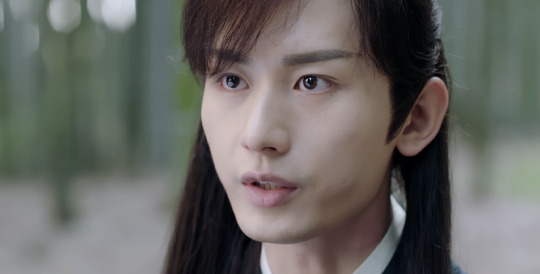
In my entire life, I never knew what a "friend" is. I finally understand now, the meaning of "fervent friendship."
Sifeng is established as the loyal lover extremely quickly. He's whipped—figuratively and literally—for Xuanji, his sheltered childhood leaving him defenseless against her unintentionally flirtatious mannerisms. He teaches her about her lost senses without judgment, nurtures limitless patience with her and others by proxy, and isn't afraid to question the status quo.
We love Sifeng for his wisdom and levelheadedness. He sees things for what they are and is commonly the voice of empathy and reason within a world of selfishness. The entire show is Sifeng going, "I might as well do it myself" in every situation because no one else cares, is capable enough, or both. He's the guy in group projects who quietly does everything and doesn't even get mad that you're the most useless team member ever. What a saint.
In the xianxia universe, he's distinct husband material (which isn’t saying much since the bar there is so low that you'd need to dig yourself a grave to reach it—which is also great because then you already have a place to go once your xianxia spouse gets you killed. I digress). His loyalty to not only others, but also who he is and what he wants, leaves him able to counter the complacency with hatred and evil permeating the world around him.
With his endless empathy, he's able to understand Luohou Jidu. While Sifeng's earliest motivation in facing the greatest devil is only to save Xuanji, he later views Luohou Jidu as an individual with his own sufferings. He's the only one to truly view Luohou Jidu as himself, not someone to eliminate, not just an extension of Xuanji. To Sifeng, everyone deserves a chance to be heard before a verdict is passed over them.
Not to mention, these two’s interactions are absolutely hilarious. I wish I could've seen the extensive conversations that must’ve went on in the censorship agency over them.
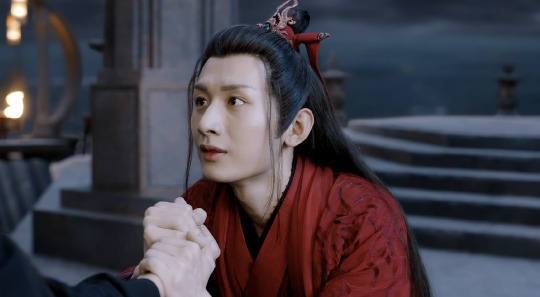
Fellas, is it gay to clasp a guy’s hands within your own and stare deeply into his eyes while reminiscing about your loving relationship if he’s technically got a woman captive in his brain?
But perhaps what shines the brightest about Sifeng is how he suffers. He's so pretty when he suffers. Wait. That's not my point.
When his Lovers’ Curse triggers for the first time, Xiao Yinhua speaks the gospel that a lot of the audience probably has in mind: "you did so much for her, you were so good to her, but she doesn’t love you back." And it sounds kind of right? But also kind of not? Then Sifeng opens his mouth and you think, "oh, crap, I've been brainwashed by misogyny yet again."

She never asked me to like her. If someone wants to kill another just because she doesn’t reciprocate their feelings, then that person will never be loved. They also don’t deserve to love another.
Again and again, Sifeng puts himself in harm's way to keep loving Xuanji. Sure, he wants her to love him back, but that's secondary to his desire to be honest with his own feelings.
With the bright beacon of light that is Sifeng’s blinding love, I feel most viewers overlook Xuanji’s capabilities as a female lead. Her comparative passiveness in the relationship makes it seem as if she doesn’t love him enough. I attribute this to the same reason as our previous conclusions, that female characters in romance dramas have a harder time garnering the audience’s approval than their male counterparts. Are we innately more judgmental toward women, or is the standard for men still so low that we’re already impressed when a guy surpasses the bare minimum? Probably both.
It's easy to forget that Xuanji is the one who's nice to Sifeng first. When they first meet, Xuanji literally falls into his arms. Then he just…drops her. (And they say chivalry is dead.) But Xuanji doesn’t care.
The rules of his sect push Sifeng into being a bit of a porcupine in his demeanor. He puts up a wall against everyone, but especially Xuanji. After all, as an innocent boy, Sifeng needs to protect himself from evil women. Or something.
Xuanji is the one who can't take the hint tries to befriend him and tears down his wall with the gentle, graceful nature of a sledgehammer. She insists that she'll retrieve his lost mask because she knows it's important to him. When she discovers that Sifeng is punished over it, Xuanji is the one to point out how unfair it is. Her straightforwardness and sense of principle are the reason Sifeng begins to open up at all.
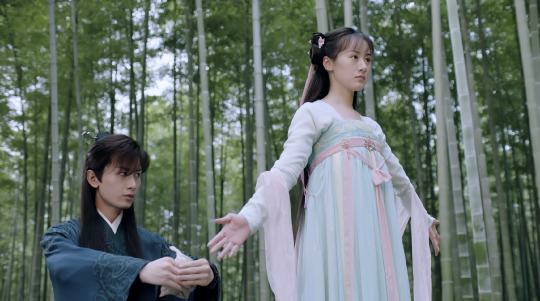
Xuanji: I’m the one who took off his mask. If you want to hit someone, hit me. [...] Not to mention, he almost died trying to get his mask back. So I'd like to ask you, Palace Leader, is Sifeng's life more important, or is that mask more important?
She knows no fear, so she doesn't consider emotionless rules to be worth anything if they cause pain for the people she cares about. In many ways, Xuanji is the one who teaches Sifeng to stand up for what he believes in.
That Xuanji lacks her six senses makes her the least susceptible to the prejudicial habits of her surroundings. She accepts what they believe, that demons are bad, but only because that's all she knows. Whereas most of her peers are content remaining in their ignorance, this supposedly heartless gal is curious about the world. She can easily abandon her preconceptions in favor of what she witnesses the world to be.
It takes constant practice and tests for Xuanji to completely shed her old beliefs. The introduction of Zi Hu marks the beginning of her growth. Xuanji, concerned and angry that Zi Hu is holding her friends captive, fully intends on killing the fox until Ting Nu reasons with her:
Ting Nu: Zi Hu isn’t a malicious demon. You shouldn’t threaten her life.
Xuanji: But she kidnapped my friends. How can I spare her? [...] No. She did bad things, so I have to kill her.
Ting Nu: [...] Zi Hu has never actually harmed anybody. She’s simply misguided by her anxieties. You should spare her life. […] If you discover that she’s actually committing malicious acts, you could kill her then, no?
If it were Minyan or Linglong in her position, you could bet that they'd ignore Ting Nu. For one, he's a merman, so of course he'd protect another demon. To Xuanji's credit, she really does give Zi Hu—and Ting Nu—the benefit of the doubt. Does she have to? No. But she does anyway.
If Sifeng’s love comes naturally, then Xuanji’s comes through determination. Who's to say that one is inherently better than the other? It takes ten lifetimes for her to understand a semblance of love. She wants dearly to understand what it means to "like" someone, even though she's already the least unafraid to show how much she cares about others.
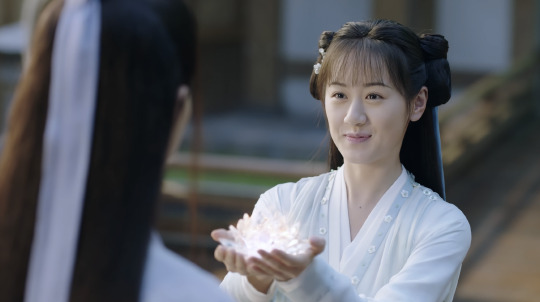
After she successfully grows the heart light for Sifeng, I don't think anyone is more excited than Xuanji herself. Look how proud she is. Obviously, she's happy she can use it to protect him, but I imagine that she also views it as the clearest proof that she’s as human as anybody else and as capable of loving as anyone else. Sifeng may be stunned when the heart light disappears, but Xuanji falls despondent—she really wants Sifeng to be someone important to her.
People sometimes struggle to see past Xuanji’s initial naivety. They're especially harsh toward her for not seeing what Sifeng has sacrificed for her until it’s almost too late. It's true, the drama primarily favors Sifeng's perspective, so it's easy to only see what he’s done and ignore Xuanji’s efforts.
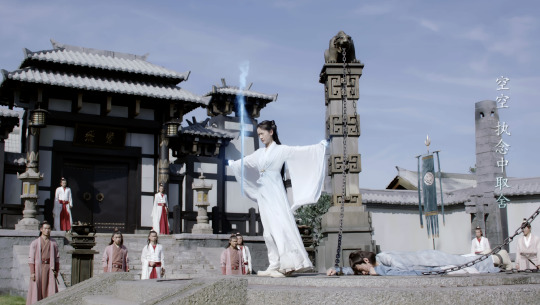
In spite of warnings from Sifeng himself to not do so, Xuanji emerges to save him from the third lash of the demon whip. You go, girl.
Love isn’t a competition. But for the sake of the discussion, let's say proof is needed that Xuanji’s effort in the relationship matches Sifeng’s. In that case, the important part is looking at what they sacrifice in a relative scope instead of an absolute one.
The things that Sifeng sacrifices are astronomical. He climbs a tower blustering with an eternal blizzard and puts on the Lovers' Curse mask. He stands right in the middle of the conflict between humans and demons even though there’s no way humans will spare him. He gets stabbed…a lot. But everything he does is a result of his own will and careful calculations—they’re all things he knows he can take responsibility for.
Sifeng's major flaw is that he's a massive liar. He's not right to lie, but he's also right to be scared about what would happen if he doesn't. As a demon, he knows what happens to anyone who isn't distinctly human. That's why he conceals his identity from Xuanji.
Then, once he discovers that Xuanji is also the reincarnation of the Star of Mosha, his fear is ignited again for her sake. Xuanji has almost always been defined by what she is, not who. She's berated for being useless when she doesn’t have her six senses. The moment she’s revealed to have the God of War's power, suddenly everyone finds her more than useful. If she's publicly revealed to be the Star of Mosha, then she'd be killed without question, and the person that is “Xuanji” will also cease to exist. Just as he doesn’t want Xuanji to view him and as anything other than himself, Sifeng doesn't want anyone else to view Xuanji as anyone other than herself. That's also why out of everyone, the one person he must keep the Star of Mosha secret from is Xuanji herself.
When Sifeng's lies begin to unfold, Xuanji is left to handle the mess he's inadvertently created. Suddenly discovering that he's a demon and also protective of the demon that possibly murdered her mother, Xuanji is torn. Her wavering faith in him isn't because of his identity, but because he lied to her.
Zi Hu: Do you dislike it that much, that [Sifeng] is a demon?
Xuanji: Should I not?
Zi Hu: Well, you healed my wounds. And you’re friends with me and Ting Nu, a merman. As for little Sifeng, he’s not a malicious demon who harms people. I don’t think he was aware of what went on with Tianxu Hall and Lize Palace.
Xuanji: That’s different! He shouldn’t have lied to me. He’s the person I trust the most. But he even kept from me who he is. Then, all the things he told me and did with me in the past…what part of it all was real and what was fake?
Zi Hu: What’s real and what’s fake? Can’t you just drag him over here and ask him? If he’s a scumbag, just kill him. But if there’s any misunderstandings, the two of you should clear them up. Resolve them and see what solutions there are. When two people are together, the scariest thing is misunderstanding one another for no reason. If you lose each other, that might be the end, forever. You’d regret that.
And then she eventually does try to kill him. Good going, Zi Hu.
Xuanji's main conflict in the latter half of the drama is that she wants to find a solution that satisfies everyone, an impossible dilemma. Everyone starts pressuring her to lead the charge against the demons. It's her duty as the God of War, isn't it? Oh, but if she doesn't want to, it's because she's in love with the enemy. But she can't be in love with the enemy. She's the God of War, after all.
That’s the duplicitous world that Xuanji lives in. Yet, without knowing why he's been dishonest or what else he could be lying about, she still chooses to believe in Sifeng—even if it means being treated as a traitor herself and being further guilt-tripped. She's bound to her duty, family, and the expectations that come along with that. Going against them in any capacity is a challenge to her entire livelihood and the moral standards imposed on her. If you take that into account, suddenly the things that she risks don’t pale in comparison what Sifeng does for her.
As an omniscient audience, it's easy for us to say that she doesn't do enough, that she should know better. It's an interesting thought experiment to wonder what else she could do in such a situation. Her boyfriend lies to her. She believes he has a reason, believes in him when he tells her to trust him. She defends him repeatedly to people who don't even care to listen unless it's to interrupt and call her crazy. She lies to her father that she'll devote herself to killing demons like Sifeng so they'll stop calling her crazy and threatening her. Then, when she goes to rescue Sifeng from Mingxia Cave, he's suddenly getting passive-aggressive with her: “oh, what does the mighty God of War need from a lowly demon like me that she deigns to talk to me?” Bro…if I were her, I might just ditch him in a fit of rage. That's how you want to play? Have fun turning into frozen poultry in this cave, then.
Obviously, more is going on behind the scenes that Xuanji is completely unaware of. Sifeng almost dies from her fire magic that Hao Chen stole. The broken hairpin. And okay, I'll admit that her saying that she'll kill him while he's eavesdropping outside is not a great look. But come on, Sifeng. Where have your critical thinking skills gone? If you can lie, don’t you think Xuanji can too? And after all that, she still instinctively shields him from her father’s sword.
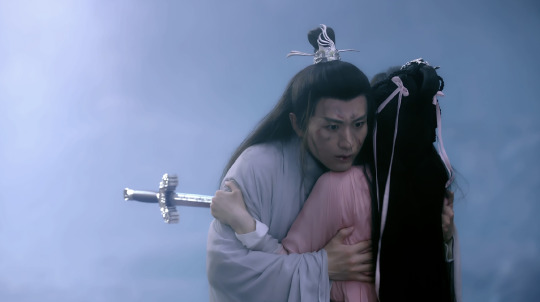
Sifeng. In this case, I do have to criticize you in a serious manner. Do you have any idea how hard it was for Xuanji to finally try to get herself stabbed for you, only for you to go “no, me” and get stabbed again? Do you have a sword-magnet in your chest?
Then Sifeng tells her that he’s never loved her and was only using her because he’s Luohou Jidu, the world's biggest villain. And she still can't bear to hurt him. When Xuanji discovers that Hao Chen has tricked her into using a so-called “Purifying Vase” to doom Sifeng to a painful death, she's furious:
Xuanji: For my own good? You want me to practice the Method of Love, but you also want me to be heartless. I can’t be so contradictory.
Hao Chen: I told you to practice the Method of Love through feelings between you and me, not for you to continuously absorb yourself in your fixation on Sifeng! Xuanji, don’t forget. Our marriage is one determined by the heavens. It’s destiny.
Xuanji: The heavens determine nothing. If they do, then why did they make Sifeng and I meet in our past nine lives? What a joke of the heavens.
Hao Chen: So, you’d rather resign yourself to your doomed fate with that demon than stay properly by my side?
Xuanji: Fate isn’t split into a virtuous or doomed one. I hate myself for loving Sifeng before, and we won’t ever be together again. But since I already gave him my love, I won’t take it back.
But of course, Hao Chen has more tricks up his Mary Poppins sleeves. He pulls out all the stops and uses his last breath to manipulate her into stabbing Sifeng. Oh my god. Look at all these trust issues, just making themselves readily available.
Her stabbing him is, how do you say, very bad. But let’s be honest, she’s seen him survive worse. I don't have a nifty conclusion is here, but basically, she subconsciously knows he'll get over it (physically, at least).
Of course, Sifeng is heartbroken. It's intensified by the tragic fate of his father. His father’s goal was always to protect Sifeng from the dangers posed by the racist five sects, led primarily by fabricated memories that his lover Hao Feng was driven to suicide by her own family. When Yuan Lang reveals the truth, that Hao Feng's fear of demons trumped her love for her husband, it’s intense foreshadowing of Sifeng and Xuanji’s relationship. Maybe Xuanji isn't like Hao Feng and she can cross the rift between humans and demons, meeting Sifeng in the middle. But finally, she still retreats, away from him. Her betrayal, now the tenth in all their lifetimes, leads Sifeng to leave behind some of the most truthful but hurtful words for Xuanji to deal with:

I finally understand why my fate turned out as it did in all my past nine lives. From beginning to end, you have always been a heartless person.
It’s not fair to ask Sifeng to keep considering Xuanji’s feelings under the brunt of her violent wrath. But just as she has no idea what he’s been doing to protect her, he has no idea what she’s been doing to protect him. Zi Hu is right again: nothing poses a greater danger to a couple than misunderstandings. And racism.
The ultimate resolution only occurs once Xuanji recovers the memories of their past lives. Congratulations, Sifeng. After a millennium of pining, your love has finally touched the heart of your beloved. Indeed, it might take a long time getting there, but love will find a way.

I love the short scenes that show the God of War and Xi Xuan's quiet but gentle relationship. Xi Xuan is the only one who cares that the God of War wants her own identity, then gives her a moment in which she doesn't have to wear her armor, just as Sifeng does everything in his power to let Xuanji be "Xuanji." Through all their lives, Sifeng is the one who recognizes her for who she is and wants to make her happy, even if she doesn't have a heart.
Activate: Xuanji, shameless mode. After Xuanji tracks down Sifeng in his solitude, they return to their days as teenagers. Xuanji acts like a fool in front of him, demanding his attention, and Sifeng only wants to get her the hell out of his house. It's not only a reminder of the times when things were a lot simpler, but also of how far they've come.
She intends on marrying Sifeng. Even if her father doesn't approve, she no longer cares. There's not enough time left in the world to hesitate about the people you love to satiate someone who can't be satisfied. Just as Sifeng upends his whole life for her, she's willing to do the same.
And as Sifeng is dying, Xuanji makes the ultimate decision to become the Star of Mosha. This isn't a reckless move done just to save him. Rather, her faith in Sifeng has strengthened into steel after all they've been through. Even if the world ends, she knows that a little bird with unshakable resolve will come get her. For two people who have spent most of their time as a pair of parallel lines, never to coincide, this is their point of intersection—a challenge that they'll face together, even if they're apart.
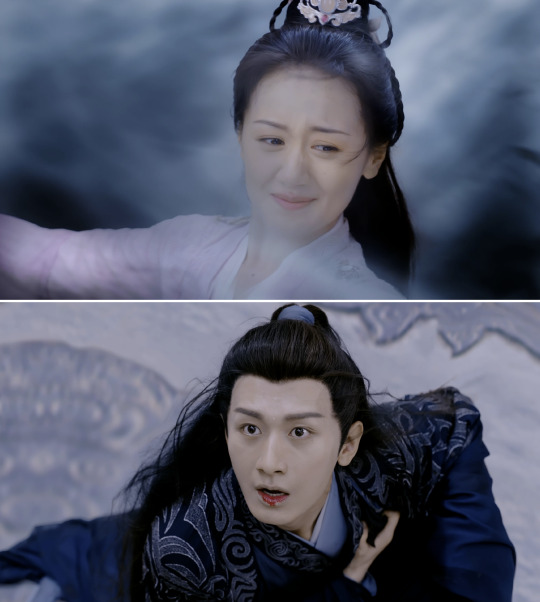
Sifeng: Xuanji, stop! I'd rather die than watch you become a devil for me!
Xuanji: Sifeng, I can't consider all that now. I have to save you! Whether I be the Star of Mosha or the God of War, I don't care. I just need you to be okay. Sifeng. If I become Luohou Jidu, you absolutely can't forget me. Remember to bring me back!
I cry during this scene. Then I immediately start laughing at Sifeng's gobsmacked expression once Luohou Jidu shows up. It just reads "but...my girlfriend..."
And Xuanji's right. Sifeng is the solution. No one else can save Luohou Jidu, the God of War, and the world by extension. Luohou Jidu's pain results from being betrayed purely because of his identity as a devil, but Sifeng becomes the confidante that Bai Lin pretended to be. The God of War's pain comes from having no self-identity, but Xi Xuan gives her the ability to seek one and accompanies her for a thousand years to help her find it. The suffering that Bai Lin set into motion would lead to a ceaseless cycle of revenge and a destruction of the world’s good due to its sins, but Sifeng alone convinces Luohou Jidu and the God of War that there's something in life worth keeping. But you have to fight for it, and persistently, because good things only come to those who are willing to chase after them.
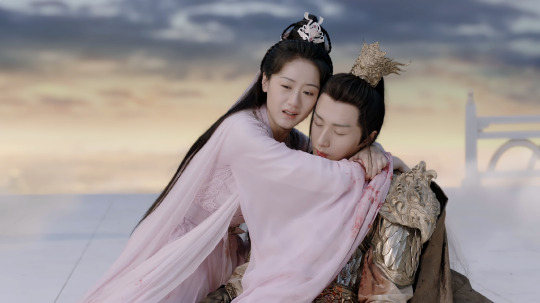
Xuanji to Bai Lin: I won’t mess with someone else’s life so simply due to my own matters, even if that person is someone as despicable as you. Sifeng once said that using hate to obtain vengeance is an endless cycle. In this life, I already have something that matters more to me than that. I have no space to keep my hatred.
I know it can sound cheesy to say that the best revenge is living a happy life. But Love and Redemption can convert even the most insistent of cynics—me, for example. People will practice evil whether or not there’s a reason for it and whether or not those consequences will ripple out into a tsunami that will engulf the world. Only true, honest love can hope to settle the uneasy sea. It’s why Zi Hu gives Wu Zhiqi something to live for other than war. It’s why Linglong and Minyan have a reason to persist alongside one another. It's why Luohou Jidu gives his heart and life to Sifeng. It’s why Sifeng is able to save Xuanji. It's why the three realms are blessed with the chance to keep finding a reason to persist.
Sifeng and Xuanji’s story is a journey of overcoming all odds; of learning to love someone unconditionally not because it’s easy, but because you want to; of letting that love grow into a ray of hope in the world. Yes, if we let it, love wins all.
Sifeng: Your heart has become one of flesh and blood. It couldn’t bear to destroy the three realms. Because…it’s a heart that I held and warmed in my hands, bit by bit.

#love and redemption#琉璃#scribbles*#originally this was only going to be about the racism#then the further i got the more i thought “well you can't just talk about the racism and not everything else”#and after adding “everything else” i figured i might as well do a sifeng/xuanji relationship analysis while i was at it#so here we are#it's below 10k words though :D so still bite-sized? ...lol
71 notes
·
View notes
Text
Air's Bizarre Christmas Rom-Com Reclist
I am a fan of Romance Media, but even more importantly, a fan of mediocre art. As such, I have watched a lot of christmas romcoms. I have in fact watched Too Many christmas romcoms. While freelancing between jobs, I would put them on in the background as mindless noise to keep me company while writing copy.
This means that I am uniquely positioned to create a rec list of christmas rom-coms that meet a very specific set of criteria:
Is the movie interesting enough to make me actually Watch it instead of half-listening to it in the background?
Are elements of the plot bizarre enough to make me yell "WHAT" at the screen?
Would I rewatch the movie in the company of friends?
Any movie that fulfills all three of these criteria is eligible to join those privileged few, the elite ranks of My Christmas Rom-Com Rec List
A Chance for Christmas (2021)
Synopsis:
"Influencer Christina Chance gets the opportunity of a lifetime: a lucrative sponsorship from the brand of her dreams. However, she soon discovers she's stuck in a time warp where the same Christmas Eve repeats itself over and over again."
Commentary:
This is a Tubi original, and it lives up to all the mess that status bestows. That established, my favorite parts of this movie are that the main character and love interest have the same kind of obsessive, perfection-driven marketing brain poison that lead them to try to min-max a time loop and learn zero lessons for the vast majority of the movie.
There's a kind of frenetic, self-absorbed energy to each of the characters that's fascinating to watch. At one point the main character attacks a man dressed like Santa in an act of misdirected rage, and the love interest holds her concerned family back while yelling "SHE NEEDS THIS LET HER GO SHE NEEDS THIS".
Also, the kids are actual characters with inner lives instead of props!
There are structural issues with the movie, and in my perfect world, the protagonist would quit her influencer job, but overall, I enjoyed it.
A Christmas Movie Christmas (2019)
Synopsis:
"A Christmas movie fanatic and her cynical sister wake up to find they are now the stars of a Christmas movie."
Commentary:
I have a soft place in my heart for scripts written by actors who have been trapped in this Christmas purgatory for years. There's a certain sensitivity to The Way Words Work that is nonexistent in most of these films. Especially since this industry relies on Never Retaking Any Line Read Ever because these movies are basically made on an assembly line.
That is to say, this movie is a love letter and a list of grievances wrapped together in a metatextual bow. All of its jabs at the genre feel like they come from a place of familiarity rather than scorn, and the actors are obviously having fun. Line deliveries and elements of blocking feel like they have actual character work put into them, and one of the love interests feels like a Christmas Homunculi with no understanding that a world other than snowglobes and sugar cookies exists. But on purpose this time! If he encountered a turtle flipped on its back, he'd start feeding it christmas cookies, and the movie is Very Aware of This. It's fun.
Baby It's Cold Inside (2021)
Synopsis:
"When a travel agent up for a promotion is directed to forget her tropical vacation and instead visit the world-famous Ice Hotel, she discovers that her sacrifices are more than compensated."
Commentary:
I'll be honest. This one is mostly here because the editing choices made me feel like I was losing my mind. I ended up dragging my roommate down to the living room at multiple points so that they could witness the same thing I was seeing. The jarring cuts, dropped story beats, and lines that lead nowhere make for an unforgettable viewing experience... except for the part where I have forgotten literally every other element of the movie. Except for the inexplicably evil love rival who becomes niceys at the end. I like her. Girlboss.
This isn't even the only Hallmark movie that was set at and filmed at Hôtel de Glace in 2021. Truly the most Hallmark movie on this list.
Christmas Perfection (2018)
Synopsis:
"Darcy's been striving for the perfect Christmas since childhood; thanks to a magical figurine her dream finally comes true."
Commentary:
I have already written up my thoughts on Christmas Perfection in EXTENSIVE detail here. Needless to say, I watch it every year. What a fascinating text. What an odd timeloop. It should have been gay.
Snowmance (2017)
Synopsis:
"Each year Sarah builds her "Snow Beau" snowman with her best friend Nick. After another breakup, she begins to wonder if she'll ever find her own true love. A little Christmas magic brings her Snow Beau to life."
Commentary:
I cannot believe the snowman actually came to life. The snowman came to life and he's not even the primary love interest. Nick sucks in a normal possessive childhood friend love interest way, fuck Nick, everyone hates Nick, sure, but THE SNOWMAN CAME TO LIFE? THE SNOWMAN CAME TO LIFE AND HE TRIES TO SELL THE PROTAGONIST'S HOUSE!!!!! SHE LIVES THERE!!!!! This movie made me scream out loud multiple times. It is not good. Please watch it.
Timeless Love (2019)
Synopsis:
"Megan wakes up from a coma in a hospital. The husband and 2 kids she just dreamed about aren't real. At her first job interview, she meets Thomas from her dream - or was it a vision years into the future?"
Commentary:
Listen to me. Listen. The establishing scenes of this movie are played completely straight. For the first chunk of the movie, it feels like this is going to be a dramatic, serious movie in a way that Hallmark Christmas Romcoms fundamentally are not, which makes it EVEN WEIRDER when it suddenly pivots into your classic nonsense. It entrances me.
Who let this happen? Why is the medical professional who is assigned to help Megan with the trauma of losing her coma-construct family and recover from being in a literal coma cartoonishly evil? Why was the information Megan obtained from the coma dream accurate to real life? Why is she suddenly okay with losing her coma children as soon as she found the real-world version of her coma-husband? What a fascinating text. I have no clue what to do with it. But maybe you do. I'm folding it into your hands. Whatever happens next is your decision
#rec list#christmas#christmas ment#i didn't put the netflix movies on here everyone knows about those and they're trying too hard to be weird#where's the naive camp i ask you
86 notes
·
View notes
Text
Venus-Saturn: A Beauty Queen
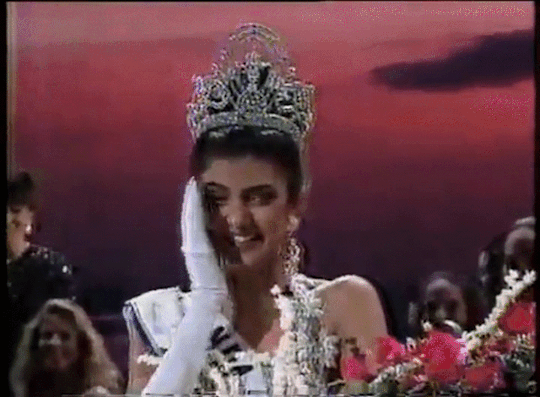
⚐ note ⚐
My first post yay! It was originally on my website but I'm deleting that soon so I brought it here.
First things first:
I do not read charts professionally.
correlation ≠ causation
If you have any of the mentioned aspects and have experience in pageantry or even an interest in it, please please feel free to talk about it in the quotes or ask box!
tw: eating disorders
⚐ note ⚐
This a veryy long post!! If you share please give me credit !!

While doing research for my Desire & Astrology project (now closed), I was reminded of something that deals with Venus but is rarely discussed, and that's beauty pageants.
Whether this is because of its declining popularity or lack of interest in something that is presumed to be shallow, beauty pageants display Venus's domain very well.
OG BEAUTY QUEEN
Let's go back, and I mean way back, to Aphrodite. She took part in a beauty contest herself. Since I will be referencing the original myth (The Judgement of Paris) that appears in the Cypria, Greek names will be used instead of Roman.
It all starts at the wedding of Peleus and Thetis, all the gods were to attend except for one, Eris, the goddess of strife and discord.
She showed up anyway but was not allowed to attend. This makes her upset and to live up to her name, she causes discord by dropping an apple that was addressed to the most beautiful.
The three goddesses: Aphrodite, Hera, and Athena began to argue about who the fairest of them all was. As we can tell, Aphrodite won and became thee beauty queen of the millennium.
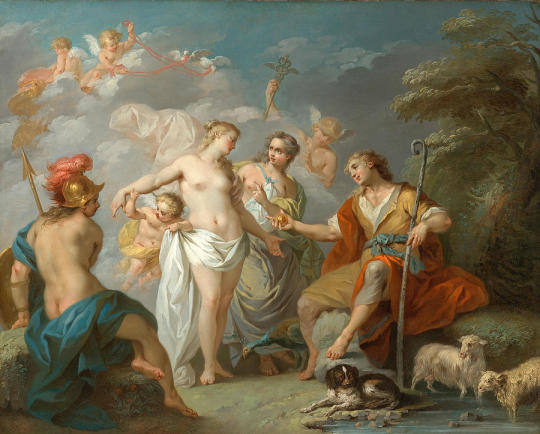
The Judgement of Paris -- Etienne Jeaurat (1699-1789)

prominence of venus-saturn aspect
I began looking up countries that had top-winning international titles (Miss World, Miss Universe, etc.) and/or had a strong pageantry culture. These countries are (most to least):
Venezuela
The Philippines
The United States
Puerto Rico
India
Australia
United Kingdom
Brazil
South Africa
Sweden
Mexico
While looking at these countries' natal charts, those who had an AA/A rating, there was a particular aspect that popped up, Venus-Saturn.
India: Venus Conjunct Saturn
United Kingdom: Venus Opposite Saturn
South Africa: Venus Square Saturn
Venezuela: Venus Opposite Saturn
It's a smaller list compared to the listed countries. So, I instead looked up the natal charts of documented beauty pageant winners.
I can't list all the women (and men!!) who have this placement it will just make the post even longer than it already is. But here are some (with AA/A rating!!):
Venessa Williams: Venus Conjunct Saturn
Michelle Pfeiffer: Venus Square Saturn
Jennifer Hosten: Venus Square Saturn
Zsa Zsa Gabor: Venus Opposite Saturn
Susan Powell: Venus Trine Saturn
Oprah Winfrey: Venus Square Saturn
Adriana Lima: Venus Square Saturn
I read 100+ charts (all had verified birth times btw), and though I'm focusing on Venus-Saturn I did notice some other aspects that appeared frequently:
Venus-North Node
Venus-Sun
Venus-MC
Why focus on the Venus-Saturn aspect? Well, I'm kind of tired of the same old description lol. But really, going through the natal charts was interesting, and of the amount that I read, over 40% had the aspect (I did the math), which made up the majority.

recap + commentary
First a recap of the planets Venus and Saturn. Venus is the planet of beauty, unity, and harmony, because of this influence this makes Venus a benefic.
On the other hand, Saturn is the planet of restriction, time, and rejection which means he is a malefic planet.
While watching these videos about the pageantry culture of many countries and the women who participated in them, I noticed the habits of these women and those who assist them.
These women were restrained. The restriction wasn't just self-imposed, it was also done by those around them (sometimes parents, other contestants, or even the public).
So, when Saturn communicates with Venus it may indicate that connecting with others, whether platonic or romantic, is difficult, strained, and restricted. And it's not just connecting with others, but also connecting with themselves.
This is more obvious with harsh aspects as the planets are in conflict. And to reach some sort of balance, you have to appease both planets.
Beauty pageants are one way to appease the conflict.
Through pageants, a person can explore the "Venusian" domain through fashion, glamor, being surrounded by women, and of course, receiving attention.
The "Saturnian" domain is explored through isolation from their families and friends, a restriction of their diet, and the development of the discipline needed to win the competition.

ATMOSPHERE OF BEAUTY PAGEANTS
I watched many documentaries and I gathered quotes that I felt showed the Venus-Saturn aspect perfectly from the preparation to the execution:
"The one who gets the crown, she has to be very disciplined, very well-centered. You have to polish the rough diamond and all the rough edges"
"Morning call at 5:30, curfew at 10 o'clock, no food outside the diet regime, no alcohol, no smoking in public. Every move is watched."
The woman given any beauty pageant title is the woman with the most discipline and shows it not only to the judges but the public.
While I watching one documentary there were two women, Neha and Gauahar, who were labeled as "stuck-up" and were given the nickname "ice-vaginas" by another contestant.
And this is a recurring assumption of those who have prominent Saturn placements. They're often seen as being aloof and cold when they are not.
While I don't have the natal charts of Neha and Gauahar, I can point out that the winner of the pageant, Neha, did display Saturn-like qualities the best.
She was strict with her diet, which included no smoking.
She was distant and focused on winning the competition only.
And while Neha didn't wish any ill or harm to the other contestants she still came off as rude or impolite.
Funnily enough, rudeness is often aligned with Saturn. Archetypically speaking, Saturn has no need for politeness or niceness, he is isolated and prefers to keep to himself.
Venus on the other hand is all about bonding, and to bond you have to be pleasant, polite, and aware of others.

BEAUTY QUEEN CONFESSIONS
Here's what some Beauty Queens had to say about their experience in pageantry:
"I had phenomenal moments as Miss America. But the reality is it is 24 hours a day every day of the week for the entirety of the year."
"Behind the scenes, there were rules like no men were allowed in your hotel, including your father."
"It's pressure to perform, pressure to produce, pressure to provide."
"The schedule was grueling. I remember having 3-5 appearances in one day. And a different city, every 18-36 hours, literally, it seems glamorous and yet it was very lonely, many times."
"It's really really hard because you are mentally drained, you are physically drained, you are isolated."
"I felt very alone, It's very isolating. It's just you and your tour manager all year."

And that's the thing, no matter how glamorous it may seem to be on stage in a glittering gown, the reality (Saturn) can be, and is, very lonely.
The rules and guidelines that used to be in place to compete were so strict, but the guidelines that followed the woman who won the title were even stricter.
No beauty pageant with beauty sounds silly, but a beauty pageant without discipline and pressure is comical.
Pressure to be graceful and composed. Pressure to have the best answer, the best smile, the best gown, the best walk, the perfect package.
As pressure makes diamonds. The pressure (Saturn) and stiffness (also Saturn) are honed into gracefulness (Venus).
--
I previously mentioned how many beauty pageant participants restrict their diet. Below are two quotes from two different documentaries:
"When I competed in Miss America there were women who, unfortunately, were currently dealing with eating disorders. One woman would only eat baby food, so she just brought baby food jars with her, and that's all she would have."
"This is my lunch, and this is what I eat two hours after lunch. Spinach with chicken broccoli with fish. It tastes horrible. Nothing has seasoning, but this is the diet. One has to make sacrifices."
As starvation is aligned with Saturn, sadly, it's not surprising to hear and see many women restricting themselves to win.
I know this is about beauty pageants, but I see the same thing with models. In fact many people, from the models themselves to people who work alongside them, mention it.
Models express how the face pressure to avoid food to keep a thin appearance.
And this pressure doesn't just come from designers and casting directors, but it's self-imposed.
Many models describe the time they were their sickest and thinnest as also the time when they experienced a boost in their career, maybe even experiencing their prime.
They joke about being "hangers", since their job is to display clothes, and the focus should be on that, not the model's body.
It seems demeaning, another Saturn thing, but it's why they strive to be so skinny.
Saturn is the planet of rejection, and rejection can foster humility or humbleness, another thing he rules over.
When models address themselves as hangers they remind not only themselves but also those around them that the attention should not be on them, but the clothes. The message is clear:
"I don't matter, the clothes do."

wrapping it up
Though the way I read birth charts is heavily influenced by Hellenistic and medieval astrological techniques, I still believe that everything is up to the person.
The focus is the theme of Venus-Saturn: disciplined and restricted beauty/connection/and love. Though using beauty pageants is a dramatic example, I feel it makes the theme and archetype of the aspect obvious.
The Venus-Saturn native understands, or at least comes to understand, that joyful things take work; beauty can bring joy, and relationships--connecting with others--bring joy, but all take work, vulnerability, and some sacrifice.
It's like this, in this context, Saturn allows you to explore the "Venusian" domain: to show yourself, enjoy the fun of dressing up, and be around people.
But you have to sacrifice your time, the habits that you previously established (eating whatever you want, smoking, etc.), and the connections you already have.
Because Venus-Saturn natives are typically so used to being in situations where this theme is emphasized it should be no surprise that they often end up winning the crown, literally and metaphorically.
© 2024 starfruiity
Gif is Susmita Sen, winner of the Miss Universe 1994 title.
#astrology#astro observations#beauty pageant#archetypes#astro notes#venus-saturn placement#birth chart#astrology observation#astronotes#venus-saturn#astroblr#astrology community#starfruit musings
63 notes
·
View notes
Text
Watching someone play Twilight Princess after having gone through Tears of the Kingdom just made me remember why I enjoyed so much of it.
For all of my other gripes with the writing and character design issues, Twilight Princess does make this commentary on how it humanizes the Twili.
Midna has a moment before you enter the Twilight Realm where she stops to tell you about her home.
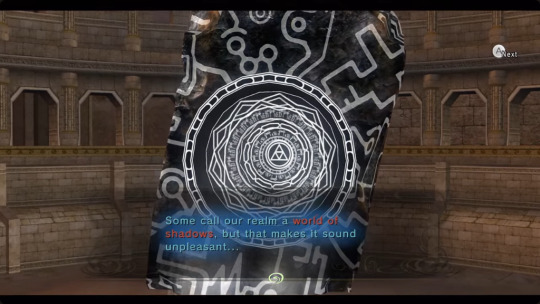
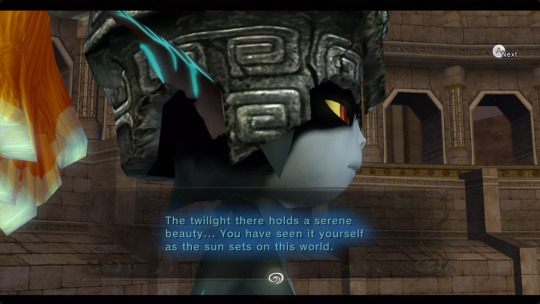
The game pretty consistently conditions you into thinking this is a dangerous place, the people referred to as descendants of interlopers.
But Midna also acts as a consistent and critical force toward Hyrule's governing structure (which is made more interesting by the fact that they don't tell you outright that Midna is a ruler herself until pretty late in the game) and toward the spirits.
A lot of the temples in Twilight Princess -- about half of them actually-- are designed with the attitude that you're not just exploring a temple but entering a space where people live and exist. The Forest Temple, Goron Mines, Snowpeak Temple, City in the Sky, and Palace of Twilight all follow that pattern.
It urges you to remember this isn't just a temple for you to clear but a place where real people who deserve safety and humanity live too. These aren't "interlopers" you need to be wary of.
This same scene also has Midna's apology, a bit of explanation to what was going on, and her resolve that the situation you're in requires helping and protecting both worlds.
Honestly--her setting her sights on prioritizing the well-being of her people and the dismissive way she treated you for it isn't even something I fault her for even if the game tries to frame it differently.
That's not to say the game is without its issues, particularly in a lot of the designs for its characters and the framing that comes with it, but I do really appreciate how the game goes out of its way to humanize a group of people Link has been conditioned to believe are less than in many ways.
The light spiirt didn't really give you a shining description, yet Midna urges you to see this not just a place where people live, but a beautiful place to live and experience.
Then when you actually go in, the very first thing Midna does is make a request related to her people and to request you help the people who live there.
Meanwhile, the same series has the way the Gerudo are largely seen as evil others by default and only granted sympathy when they're explicitly aligned with Hyrule. Even TP does that with Midna in how her dying move was to save Hyrule's people. I realize the Twili still run into a lot of savior narratives centering Link, but I still appreciate this little portion of the game.
I wish the series as a whole took that sort of attitude because that dehumanization is often just done straight, but there is the freedom to critique Hyrule, its leadership, and its governing structure that I feel isn't quite there in the series now and even Twilight Princess still doesn't quite scratch the itch.
I really wish Rauru got more of the Midna treatment in how he can openly share his thoughts and feelings, how he can be a voice of criticism but also be criticized himself narratively much like Midna did.
I don't think it's a coincidence that Midna is overwhelmingly considered the best companion Link has had by so many people.
91 notes
·
View notes
Text
Tord Headcanons | The Stoic One
---
Let's start with his physical appearance!
My Tord has pale skin, since he is from Norway and doesn't get a lot of sun.
His hair is naturally that dark brown color that we see in Classic, but he dyes it the caramel brown color from Legacy- though, sometimes he can be seen with dark brown roots when he needs to touch up the dye.
My Tord has silver eyes, and I often describe them as piercing or being able to see through people. I think his eyes are one of the most unnerving parts of Tord, and makes people uncomfortable.
No facial hair- he shaves it if it starts to get stubbly.
Tord is the second tallest in my timeline, standing at 6'4 (I like my boys inhumanely tall). Edd is the only one taller than him and it pisses Tord off to no end.
I like to think Tord has the most athletic build of the group, being the military oriented one. He's not skinny and he doesn't have painfully unnatural muscles like you'd see in magazines. Think more along the lines of Chris Evans or Sebastian Stan. (Also has the juiciest man tiddies) Tord would alternate between going to the gym in the morning and going on morning runs through the neighborhood. He runs more often during the winter, since he's always thrived in cold weather. If Reader also liked working out or was interested in starting, he'd gladly let them join him. I think he'd even teach them self defense if they asked.
Because I think Tord would have some connection to his cultural roots, my Tord has a small tattoo of Yggdrasil on his collarbone, and an even smaller protection rune on one of his wrists. He has a piercing hole in one of his ears that he sometimes wears a simple black stud in; he got it pierced during his emo phase in high school.
Family life:
Tord is an older brother is one younger sister. He practically raised her until he moved out.
His dad was Red Leader before him and put him through intense training. Turned him into a child soldier. Resents his dad for it all.
Only time he ever argued with his dad is when he tried to give his sister the same training- Tord refused to let him.
Worst thing his dad ever did was make Tord do wilderness survival for 3 nights in a Norwegian forest. He was 12.
A Eurasian Lynx managed to find him, but he got away with only claw marks on his back. He's still got the scars.
He doesn't hate his mother, but he's not particularly close with her. Because his training started from such a young age, he spent most of his childhood around his father and other high ranking soldiers.
Cares a lot about his little sister and travels home to see her once or twice a year.
Now, personality:
My Tord is very apathetic sometimes, but mainly is just kind of calm and chill.
He likes to say that he'd rather be with his machines and inventions than other humans, but that's a bullshit lie and he's just being dramatic
Prefers being quiet, doesn't say a lot unless its under specific circumstances or he has commentary to give. He enjoys listening to Reader ramble endlessly, or just have her in his arms while he silently does some task.
He switched from cigarettes to vapes after a while, since its better than smoking and has more flavors available.
Likes energy drinks more than coffee, enjoys the variety they offer.
Actually pretty good at cooking, he'd cook for himself and his sister when his parents were busy with work.
Way smarter than he looks. If he had to take the ACT, he'd probably get a nearly perfect score.
A STEM girlie. He uses the garage as his workshop and spends most of the day there (not counting weekends).
Absolutely has a motorcycle in the garage. He rides it if he's having a low day and needs to get away. Has a special route that takes him the long way through the city before ending up at the cliff overlooking the neighborhood (the one we see in The End). Takes Reader on that route to cheer her up or clear her head. One time they fell asleep on the cliff and woke up to several calls from Edd, Tom, and Matt, who were all scared shitless.
Never gets cold. If someone comments on it, he says its "nothing compared to Norwegian cold." (The others are all tired of hearing that and roll their eyes)
Despite this, he's not dumb. He knows how to stay warm and how important it is. Will scold Reader for not wearing enough layers.
His music taste is so mixed up and wild that nobody can give it a name.
Probably reads the most out of the four, will never tell you what he's reading.
Gets angry about historical inaccuracies.
Not allowed to play Trivial Pursuit because he knows a bunch of random facts.
"Kill yourself." "This is why we can't have nice things."
Likes Super Smash Brothers and can create ass kicking combos for any character in a couple of rounds.
He works as a mechanical/chemical engineer. Works independently by taking commissions for blueprints and fixing machines for people. He mostly works at home in the garage but very rarely has to go to another location. He prefers to have the client talk to him over the phone or meet him.
Likes Liquid Death Mountain Water.
Smokes cigars occasionally, usually on special events.
Smells like smoky wood and vanilla.
Does some art every so often, but not as often as Edd.
Vibes/Aesthetic:
Red LED lights as the only light source
Night so late the entire house is silent
Sneaking out of the house to get candy and drinks at the gas station
Sleep Token playing on the drive
Anime on his laptop
Making battery acid drinks together
Fucking instead of sleeping
Athletic shorts and hoodies
Thigh high socks
Late night drives
Vape clouds and suckers
Trying to stay quiet
Playlist (Based off my Own Spotify Playlist for Him):
Sleep Token
CORPSE
Hollywood Undead
Twenty One Pilots
Kanye West
Childish Gambino
Eminem
Glass Animals
Rob Zombie
48 notes
·
View notes